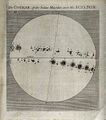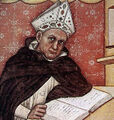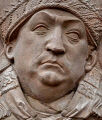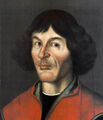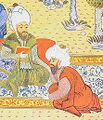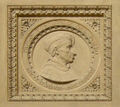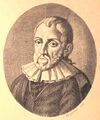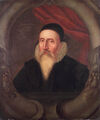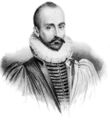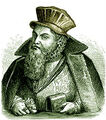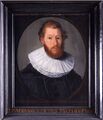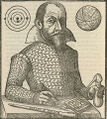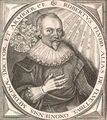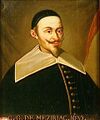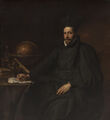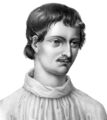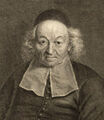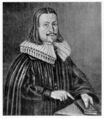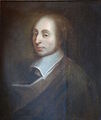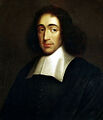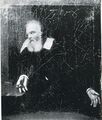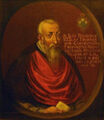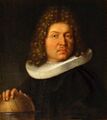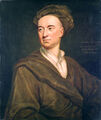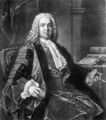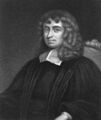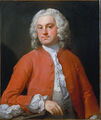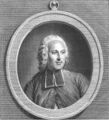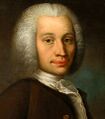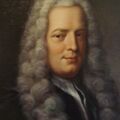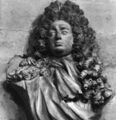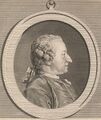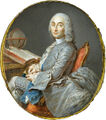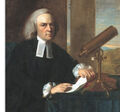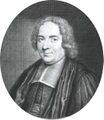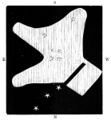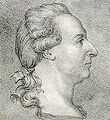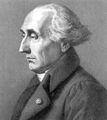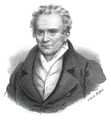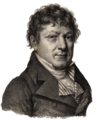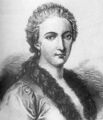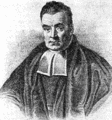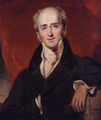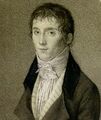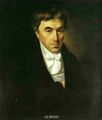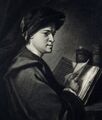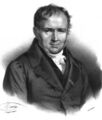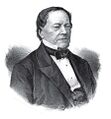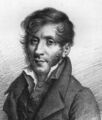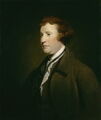Timeline: Early (nonfiction): Difference between revisions
No edit summary |
No edit summary |
||
| Line 1: | Line 1: | ||
Timeline of non-fictional "On This Day in History" items up to 1799 AD. | |||
See also [[Timeline: Middle (nonfiction)|Middle Timeline]] and [[Timeline: Middle (nonfiction)|Modern Timeline]] | |||
<gallery> | |||
File:Eclipse.jpg|link=Eclipse (nonfiction)|413 BC Aug. 28: A lunar [[Eclipse (nonfiction)|eclipse]] caused panic among the sailors of the Athens fleet and thus affected the outcome of a crucial battle in the Peloponnesian War. The Athenians were ready to withdraw their forces from Syracuse when the Moon was eclipsed, but the eclipse caused the superstitious Athenian general Nicias to delay their departure. This delay gave an advantage to their enemies, the Syracusans, who then defeated the entire Athenian fleet and army, and killed Nicias. | |||
File:Demosthenes.jpg|link=Demosthenes (nonfiction)|322 BC Oct. 12: Athenian politician and orator [[Demosthenes (nonfiction)|Demosthenes]] takes his own life, to avoid being arrested by the agents of his enemies. | |||
File:Julius_Caesar_-_Tusculum_portrait.jpg|link=Julius Caesar (nonfiction)|100 BC Jul. 13: Roman general and statesman [[Julius Caesar (nonfiction)|Julius Caesar]] born. He will play a critical role in the events that led to the demise of the Roman Republic and the rise of the Roman Empire. | |||
File:Julius_Caesar_-_Tusculum_portrait.jpg|link=Julius Caesar (nonfiction)|44 BC: [[Julius Caesar (nonfiction)|Julius Caesar]], Dictator of the Roman Republic, is stabbed to death by Marcus Junius Brutus, Gaius Cassius Longinus, Decimus Junius Brutus, and several other Roman senators on the Ides of March. | |||
File:Sunspots.jpg|link=Sunspot (nonfiction)|28 BC May 10: A [[Sunspot (nonfiction)|sunspot]] is observed by Han dynasty astronomers during the reign of Emperor Cheng of Han, one of the earliest dated sunspot observations in China. | |||
</gallery> | |||
900s | |||
<gallery> | |||
File:Buzjani.jpg|link=Abu al-Wafa' Buzjani (nonfiction)|940 Jun. 10: Mathematician and astronomer [[Abu al-Wafa' Buzjani (nonfiction)|Abū al-Wafā' Būzjānī]] born. His ''Almagest'' will be widely read by medieval Arabic astronomers in the centuries after his death. | |||
File:Buzjani.jpg|link=Abu al-Wafa' Buzjani (nonfiction)|998 Jul 15: Mathematician and astronomer [[Abu al-Wafa' Buzjani (nonfiction)|Abū al-Wafā' Būzjānī]] dies. His ''Almagest'' was widely read by medieval Arabic astronomers in the centuries after his death. | |||
</gallery> | |||
1000s | |||
<gallery> | |||
File:Hermann_der_Lahme.gif|link=Hermann of Reichenau (nonfiction)|1013 Jul 18: Composer, mathematician, and astronomer [[Hermann of Reichenau (nonfiction)|Hermann of Reichenau]] born. He will write a treatise on the science of music, several works on geometry and arithmetic, and astronomical treatises (including instructions for the construction of an astrolabe, then a very novel device in Western Europe). | |||
File:Hermann_der_Lahme.gif|link=Hermann of Reichenau (nonfiction)|1054 Sep. 24: Composer, mathematician, and astronomer [[Hermann of Reichenau (nonfiction)|Hermann of Reichenau]] dies. He wrote a treatise on the science of music, several works on geometry and arithmetics and astronomical treatises (including instructions for the construction of an astrolabe, at the time a very novel device in Western Europe). | |||
</gallery> | |||
1100s | |||
<gallery> | |||
File:Statue of Ibn Rushd in Cordoba.jpg|link=Ibn Rushd (nonfiction)|1126 Apr. 14: Polymath [[Ibn Rushd (nonfiction)|Ibn Rushd]] (Averoess) born. He will write on logic, Aristotelian and Islamic philosophy, theology, the Maliki school of Islamic jurisprudence, psychology, political and Andalusian classical music theory, geography, mathematics, and the mediæval sciences of medicine, astronomy, physics, and celestial mechanics. | |||
File:Giordano Bruno crater.jpg|link=Giordano Bruno (crater) (nonfiction)|1178 Jun. 18: Five Canterbury monks see what is possibly the [[Giordano Bruno (crater) (nonfiction)|Giordano Bruno crater]] being formed. It is believed that the current oscillations of the Moon's distance from the Earth (on the order of meters) are a result of this collision. | |||
File:Statue of Ibn Rushd in Cordoba.jpg|link=Ibn Rushd (nonfiction)|1198 Dec. 10: Polymath [[Ibn Rushd (nonfiction)|Ibn Rushd]] (Averoess) dies. He wrote on logic, Aristotelian and Islamic philosophy, theology, the Maliki school of Islamic jurisprudence, psychology, political and Andalusian classical music theory, geography, mathematics, and the mediæval sciences of medicine, astronomy, physics, and celestial mechanics. | |||
</gallery> | |||
1200's | |||
<gallery> | |||
File:Albertus Magnus.jpg|link=Albertus Magnus (nonfiction)|1280 Nov. 15: Bishop, theologian, and philosopher [[Albertus Magnus (nonfiction)|Albertus Magnus]] dies. He was known during his lifetime as ''doctor universalis'' and ''doctor expertus'' and, late in his life, the term ''magnus'' was appended to his name. | |||
</gallery> | |||
1300's | |||
<gallery> | |||
File:Gentile da Foligno (Nuremberg Chronicle).jpg|link=Gentile da Foligno (nonfiction)|1348 Jun. 18: Physician and academic [[Gentile da Foligno (nonfiction)|Gentile Gentili da Foligno]] dies. Da Foligno was among the first European physicians to perform a dissection on a human being (1341). | |||
File:Jan Kanty.jpg|link=John Cantius (nonfiction)|1390 Jun. 23: Priest, philosopher, physicist, and theologian [[John Cantius (nonfiction)|John Cantius]] born. He will help develop Jean Buridan's theory of impetus, anticipating the work of Galileo and Newton. | |||
</gallery> | |||
1400s | |||
<gallery> | |||
File:Nezahualcoyotl.jpg|link=Nezahualcoyotl (nonfiction)|1402 Apr. 28: Aztec philosopher, warrior, architect, poet, and ruler [[Nezahualcoyotl (nonfiction)|Nezahualcoyotl]] born. He will have an experience of an "Unknown, Unknowable Lord of Everywhere" to whom he will build an entirely empty temple in which no blood sacrifices of any kind will be allowed. | |||
File:Theoricarum by Peuerbach 1915.png|link=Georg von Peuerbach (nonfiction)|1423 May 30: Mathematician and astronomer [[Georg von Peuerbach (nonfiction)|Georg von Peuerbach]] born. He will be remembered for his streamlined presentation of Ptolemaic astronomy in the ''Theoricae Novae Planetarum''. | |||
File:Antonio Manetti.jpg|link=Antonio Manetti (nonfiction)|1423 Jul. 6: Mathematician and architect [[Antonio Manetti (nonfiction)|Antonio Manetti]] born. He will investigate the site, shape and size of Dante's ''Inferno'', and write a biography of the architect Filippo Brunelleschi. | |||
File:Marsilio Ficino from a fresco by Domenico Ghirlandaio.jpg|link=Marsilio Ficino (nonfiction)|1433 Oct. 19: Priest, humanist philosopher, and astrologer [[Marsilio Ficino (nonfiction)|Marsilio Ficino]] born. His Florentine Academy, an attempt to revive Plato's Academy, will influence the direction and tenor of the Italian Renaissance and the development of European philosophy. | |||
File:Regiomontanus Nuremberg chronicles.jpg|link=Regiomontanus (nonfiction)|1436 June 6: Mathematician, astronomer, and bishop [[Regiomontanus (nonfiction)|Johann Regiomontanus]] born. His contributions will be instrumental in the development of Copernican heliocentrism in the decades following his death. | |||
File:Leonardo by Meizi.jpg|link=Leonardo da Vinci (nonfiction)|1452: Polymath [[Leonardo da Vinci (nonfiction)|Leonardo da Vinci]] born. His areas of interest will include painting, sculpting, architecture, invention, science, music, mathematics, engineering, literature, anatomy, geology, astronomy, botany, writing, history, and cartography. | |||
File:Johannes Stöffler.jpg|link=Johannes Stöffler (nonfiction)|1452 Dec. 10: Mathematician, astronomer, astrologer, priest, maker of astronomical instruments, and professor [[Johannes Stöffler (nonfiction)|Johannes Stöffler]] born. | |||
File:Title page of the Astrolabium of Johannes Engel, printed by Johann Emerich, Venice 1494.jpg|link=Johannes Engel (nonfiction)|1453 Mar. 2: Doctor, astronomer, and astrologer [[Johannes Engel (nonfiction)|Johannes Engel]] born. He will publish numerous almanacs, planetary tables, and calendars. | |||
File:Theoricarum by Peuerbach 1915.png|link=Georg von Peuerbach (nonfiction)|1461 Apr. 8: Mathematician and astronomer [[Georg von Peuerbach (nonfiction)|Georg von Peuerbach]] dies. He is remembered for his streamlined presentation of Ptolemaic astronomy in the ''Theoricae Novae Planetarum''. | |||
File:Johannes Trithemius.jpg|link=Johannes Trithemius (nonfiction)|1462 Feb. 1: Polymath [[Johannes Trithemius (nonfiction)|Johannes Trithemius]] born. He will be remembered as a lexicographer, chronicler, cryptographer, and occultist. | |||
File:Martin Waldseemüller.jpg|link=Martin Waldseemüller (nonfiction)|1470 Sep. 11: Mapmaker [[Martin Waldseemüller (nonfiction)|Martin Waldseemüller]] born. He will produce a globular world map and a large 12-panel world wall map using the information from Columbus and Vespucci's travels (Universalis Cosmographia), both bearing the first use of the name "America". | |||
File:Albrecht Dürer self-portrait.jpg|link=Albrecht Dürer (nonfiction)|1471 May 21: Painter, engraver, and mathematician [[Albrecht Dürer (nonfiction)|Albrecht Dürer]] born. Dürer will be regarded as the greatest German Renaissance artist: his vast body of work will include altarpieces and religious works, numerous portraits and self-portraits, and copper engravings. | |||
File:Nezahualcoyotl.jpg|link=Nezahualcoyotl (nonfiction)|1472 Jun. 4: Aztec philosopher, warrior, architect, poet, and ruler [[Nezahualcoyotl (nonfiction)|Nezahualcoyotl]] dies. He had an experience of an "Unknown, Unknowable Lord of Everywhere" to whom he built an entirely empty temple in which no blood sacrifices of any kind were allowed. | |||
File:Nikolaus Kopernikus.jpg|link=Nicolaus Copernicus (nonfiction)|1473 Feb. 19: Mathematician and astronomer [[Nicolaus Copernicus (nonfiction)|Nicolaus Copernicus]] born. He will formulate a model of the universe that places the Sun rather than the Earth at the center of the universe. | |||
File:Jan Kanty.jpg|link=John Cantius (nonfiction)|1473 Dec. 24: Priest, philosopher, physicist, and theologian [[John Cantius (nonfiction)|John Cantius]] dies. He helped develop Jean Buridan's theory of impetus, anticipating the work of Galileo and Newton. | |||
File:Ali_Qushji_at_the_feet_of_Mehmed_II_(detail).jpg|link=Ali Qushji (nonfiction)|1474 Dec. 16: Astronomer, mathematician, and physicist [[Ali Qushji (nonfiction)|Ali Qushji]] dies. Qushji contributed to the development of astronomical physics independent from natural philosophy, and provided empirical evidence for the Earth's rotation. | |||
File:Regiomontanus Nuremberg chronicles.jpg|link=Regiomontanus (nonfiction)|1476 Jul. 6: Mathematician, astronomer, and bishop [[Regiomontanus (nonfiction)|Johann Regiomontanus]] dies. Regiomontanu made contributions to astronomy which will be instrumental in the development of Copernican heliocentrism in the follwing decades. | |||
File:Johannes Schöner.jpg|link=Johannes Schöner (nonfiction)|1477 Jan. 16: [[Johannes Schöner (nonfiction)|Johannes Schöner]] born. He will enjoy a European wide reputation as an innovative and influential globe maker and cosmographer and as one of the continent's leading and most authoritative astrologers. | |||
File:Toscanelli.jpg|link=Paolo dal Pozzo Toscanelli (nonfiction)|1482 May 10: Mathematician and astronomer [[Paolo dal Pozzo Toscanelli (nonfiction)|Paolo dal Pozzo Toscanelli]] dies. Thanks to his long life, his intelligence and his wide interests, Toscanelli was one of the central figures in the intellectual and cultural history of Renaissance Florence in its early years. | |||
File:Antonio Manetti.jpg|link=Antonio Manetti (nonfiction)|1497 May 26: Mathematician and architect [[Antonio Manetti (nonfiction)|Antonio Manetti]] dies. He investigated the site, shape and size of Dante's ''Inferno'', and wrote a biography of the architect Filippo Brunelleschi. | |||
File:Marsilio Ficino from a fresco by Domenico Ghirlandaio.jpg|link=Marsilio Ficino (nonfiction)|1499 Oct. 1: Priest, humanist philosopher, and astrologer [[Marsilio Ficino (nonfiction)|Marsilio Ficino]] dies. His Florentine Academy, an attempt to revive Plato's Academy, influenced the direction and tenor of the Italian Renaissance and the development of European philosophy. | |||
</gallery> | |||
1500s | |||
<gallery> | |||
File:Gerolamo Cardano.jpg|link=Gerolamo Cardano (nonfiction)|1501 Sep. 24: [[Gerolamo Cardano (nonfiction)|Gerolamo Cardano]] born. He will be one of the most influential mathematicians of the Renaissance. | |||
File:Pedro Nunes.png|link=Pedro Nunes (nonfiction)|1502 Jan. 11: Mathematician, cosmographer, and academic [[Pedro Nunes (nonfiction)|Pedro Nunes]] born. He will be one of the greatest mathematicians of his time, known for his mathematical approach to navigation and cartography. | |||
File:Christian Egenolff.jpg|link=Christian Egenolff (nonfiction)|1502 Jul. 26: [[Christian Egenolff (nonfiction)|Christian Egenolff]] born. He will be the first important printer and publisher operating from Frankfurt-am-Main. | |||
File:Reinerus Frisius Gemma, by Maarten van Heemskerck.jpg|link=Gemma Frisius (nonfiction)|1508 Dec. 9: Physician, mathematician, and cartographer [[Gemma Frisius (nonfiction)|Gemma Frisius]] born. He will create important globes, improve the mathematical instruments of his day, and apply mathematics to surveying and navigation in new ways. | |||
File:Bernardino Telesio.jpg|link=Bernardino Telesio (nonfiction)|1509 Nov. 7: Philosopher and scientist [[Bernardino Telesio (nonfiction)|Bernardino Telesio]] born. His emphasis on observation will influence the emergence of the scientific method. | |||
File:Title page of the Astrolabium of Johannes Engel, printed by Johann Emerich, Venice 1494.jpg|link=Johannes Engel (nonfiction)|1512 Sep. 29: Doctor, astronomer, and astrologer [[Johannes Engel (nonfiction)|Johannes Engel]] dies. He published numerous almanacs, planetary tables, and calendars. | |||
File:Johannes Trithemius.jpg|link=Johannes Trithemius (nonfiction)|1516 Dec. 13: Polymath [[Johannes Trithemius (nonfiction)|Johannes Trithemius]] dies. He is remembered as a lexicographer, chronicler, cryptographer, and occultist. | |||
File:Li Shizhen.jpg|link=Li Shizhen (nonfiction)|1518 Jul 3: Physician and scientist [[Li Shizhen (nonfiction)|Li Shizhen]] born. He will develop many innovative methods for the proper classification of herb components and medications to be used for treating diseases, earning a reputation as the greatest scientific naturalist of China. | |||
File:Leonardo by Meizi.jpg|link=Leonardo da Vinci (nonfiction)|1519 May 2: Polymath [[Leonardo da Vinci (nonfiction)|Leonardo da Vinci]] dies. His areas of interest included painting, sculpting, architecture, invention, science, music, mathematics, engineering, literature, anatomy, geology, astronomy, botany, writing, history, and cartography. | |||
File:Martin Waldseemüller.jpg|link=Martin Waldseemüller (nonfiction)|1520 Mar. 16: Mapmaker [[Martin Waldseemüller (nonfiction)|Martin Waldseemüller]] dies. He produced a globular world map and a large 12-panel world wall map using the information from Columbus and Vespucci's travels (Universalis Cosmographia), both bearing the first use of the name "America". | |||
File:Blaise_de_Vigenère.png|link=Blaise de Vigenère (nonfiction)|1523 Apr. 5: Cryptographer and diplomat [[Blaise de Vigenère (nonfiction)]] born. The Vigenère cipher will be misattributed to him; Vigenère himself will devise a different, stronger cipher. | |||
File:Abraham Ortelius by Peter Paul Rubens.jpg|link=Abraham Ortelius (nonfiction)|1527 Apr. 14: Cartographer and geographer [[Abraham Ortelius (nonfiction)|Abraham Ortelius]] born. Ortelius will create the first modern atlas, the ''Theatrum Orbis Terrarum''. He will also be one of the first to imagine that the continents were joined together before drifting to their present positions. | |||
File:John Dee.jpg|link=John Dee (nonfiction)|1527 Jul. 13: Mathematician, astronomer, and astrologer [[John Dee (nonfiction)|John Dee]] born. He will achieve high status as a scholar and play a role in Elizabethan politics. | |||
File:Albrecht Dürer self-portrait.jpg|link=Albrecht Dürer (nonfiction)|1528 Apr. 6: Painter, engraver, and mathematician [[Albrecht Dürer (nonfiction)|Albrecht Dürer]] dies. Dürer is regarded as the greatest German Renaissance artist: his vast body of work will include altarpieces and religious works, numerous portraits and self-portraits, and copper engravings. | |||
File:Michele_Mercati_by_Petrus_Nellus.jpg|link=Michele Mercati (nonfiction)|1541 Apr. 8: Physician and archaeologist [[Michele Mercati (nonfiction)|Michele Mercati]] born. He will be one of the first scholars to recognize prehistoric stone tools as human-made rather than natural or mythologically created thunderstones. | |||
File:Michel de Montaigne.jpg|link=Michel de Montaigne (nonfiction)|1533 Feb. 28: Philosopher and author [[Michel de Montaigne (nonfiction)|Michel de Montaigne]] born. He will be one of the most significant philosophers of the French Renaissance, known for popularizing the essay as a literary genre. | |||
File:Nikolaus Kopernikus.jpg|link=Nicolaus Copernicus (nonfiction)|1543 May 24: Mathematician and astronomer [[Nicolaus Copernicus (nonfiction)|Nicolaus Copernicus]] dies. He formulated a model of the universe that places the Sun rather than the Earth at the center of the universe. | |||
File:Johannes Schöner.jpg|link=Johannes Schöner (nonfiction)|1547 Jan. 16: [[Johannes Schöner (nonfiction)|Johannes Schöner]] dies. He enjoyed a European wide reputation as an innovative and influential globe maker and cosmographer and as one of the continent's leading and most authoritative astrologers. | |||
File:Philipp Nicodemus Frischlin.jpg|link=Philipp Nicodemus Frischlin (nonfiction)|1547 Sep. 22: Philologist, mathematician, astronomer, and poet [[Philipp Nicodemus Frischlin (nonfiction)|Philipp Nicodemus Frischlin]] born. His prolific and versatile genius will produce a great variety of works, but his reckless life and libelous letters will lead to imprisonment. | |||
File:Michael Maestlin.jpg|link=Michael Maestlin (nonfiction)|1550 Sep. 30: Astronomer and mathematician [[Michael Maestlin (nonfiction)|Michael Maestlin]] born. He will be a mentor to [[Johannes Kepler (nonfiction)|Johannes Kepler]], and play a sizable part in his adoption of the Copernican system. | |||
File:Cesare Cremonini.jpg|link=Cesare Cremonini (nonfiction)|1550 Dec. 22: Philosopher and academic [[Cesare Cremonini (nonfiction)|Cesare Cremonini]] born. His work will promote rationalism (against revelation) and Aristotelian materialism (against the dualist immortality of the soul) inside scholasticism. | |||
File:Pedro Mejía.jpg|link=Pedro Mexía (nonfiction)|1551 Jan. 17: Writer, humanist, and historian [[Pedro Mexía (nonfiction)|Pedro Mexía]] dies. He wrote ''Silva de varia lección'' ("A Miscellany of Several Lessons"), which became an early best seller across Europe. | |||
File:Paolo Sarpi.jpg|link=Paolo Sarpi (nonfiction)|1552 Aug. 14: Statesman, scientist, and historian [[Paolo Sarpi (nonfiction)|Paolo Sarpi]] born. He will be a proponent of the Copernican system, a friend and patron of Galileo Galilei, and a keen follower of the latest research on anatomy, astronomy, and ballistics at the University of Padua. | |||
File:Christian Egenolff.jpg|link=Christian Egenolff (nonfiction)|1555 Feb. 9: [[Christian Egenolff (nonfiction)|Christian Egenolff]] dies. He was the first important printer and publisher operating from Frankfurt-am-Main. | |||
File:Reinerus Frisius Gemma, by Maarten van Heemskerck.jpg|link=Gemma Frisius (nonfiction)|1555 May 25: Physician, mathematician, and cartographer [[Gemma Frisius (nonfiction)|Gemma Frisius]] dies. He created important globes, improved the mathematical instruments of his day, and applied mathematics to surveying and navigation in new ways. | |||
File:Giovanni Antonio Magini.jpg|link=Giovanni Antonio Magini (nonfiction)|1555 Jun. 13: Mathematician, cartographer, and astronomer [[Giovanni Antonio Magini (nonfiction)|Giovanni Antonio Magini]] born. He will support a geocentric system of the world, in preference to Copernicus's heliocentric system. | |||
File:Oronce Finé.jpg|link=Oronce Finé (nonfiction)|1555 Aug. 8: Mathematician and cartographer [[Oronce Finé (nonfiction)|Oronce Finé]] dies. He was imprisoned in 1524, probably for practicing [[Judicial astrology (nonfiction)|judicial astrology]]. | |||
File:Tycho Brahe.jpg|link=Tycho Brahe (nonfiction)|1560 Aug. 21: The occurrence at the predicted time of a solar eclipse in Copenhagen turns [[Tycho Brahe (nonfiction)|Tycho Brahe]] towards a life of observational astronomy. | |||
File:Thomas Fincke.jpg|link=Thomas Fincke (nonfiction)|1561 Jan. 6: Mathematician and physicist [[Thomas Fincke (nonfiction)|Thomas Fincke]] born. He will introduce the modern names of the trigonometric functions tangent and secant. | |||
File:Cornelis de Houtman.jpg|link=Cornelis de Houtman (nonfiction)|1565: Explorer [[Cornelis de Houtman (nonfiction)|Cornelis de Houtman]] born. He will discover a new sea route from Europe to Indonesia, beginning the Dutch spice trade. | |||
File:Abraham Ortelius by Peter Paul Rubens.jpg|link=Abraham Ortelius (nonfiction)|1570 May 20: Cartographer and geographer [[Abraham Ortelius (nonfiction)|Abraham Ortelius]] issues ''Theatrum Orbis Terrarum'', the first modern atlas. Pic. | |||
File:Gerolamo Cardano.jpg|link=Gerolamo Cardano (nonfiction)|1570 Oct. 6: [[Gerolamo Cardano (nonfiction)|Gerolamo Cardano]] imprisoned for 87 days on charges of impiety (casting a horoscope of Christ). He spent the remaining five years of his life in Rome under the eye of a suspicious pope who nonetheless gave him a pension. | |||
File:Adriaan Metius.jpg|link=Adriaan Metius (nonfiction)|1571 Dec. 9: Mathematician and astronomer [[Adriaan Metius (nonfiction)|Adriaan Metius]] born. He will manufacture precision astronomical instruments, and published treatises on the astrolabe and on surveying. | |||
File:Simon Marius.jpg|link=Simon Marius (nonfiction)|1573 Jan. 20: Astronomer [[Simon Marius (nonfiction)|Simon Marius]] born. He will discover the four largest moons of Jupiter, independently of Galileo Galilei. | |||
File:Robert Fludd.jpg|link=Robert Fludd (nonfiction)|1574 Jan. 17: Astrologer, mathematician, cosmologist, Qabalist and Rosicrucian apologist [[Robert Fludd (nonfiction)|Robert Fludd]] born. | |||
File:William Oughtred.jpg|link=William Oughtred (nonfiction)|1574 Mar. 5: Mathematician [[William Oughtred (nonfiction)|William Oughtred]] born. He will invent the slide rule in 1622. | |||
File:Gerolamo Cardano.jpg|link=Gerolamo Cardano (nonfiction)|1576 Sep. 21: [[Gerolamo Cardano (nonfiction)|Gerolamo Cardano]] dies. He was one of the most influential mathematicians of the Renaissance. | |||
File:Paul Guldin.jpg|link=Paul Guldin (nonfiction)|1577 Jun. 12: Astronomer and mathematician [[Paul Guldin (nonfiction)|Paul Guldin]] born. He will discover the Guldinus theorem, which determines the surface and the volume of a solid of revolution. | |||
File:Pedro Nunes.png|link=Pedro Nunes (nonfiction)|1578 Aug. 11: Mathematician, cosmographer, and academic [[Pedro Nunes (nonfiction)|Pedro Nunes]] dies. He was one of the greatest mathematicians of his time, best known for his mathematical approach to navigation and cartography. | |||
File:Willebrord Snellius.jpg|link=|1580 Jun. 13: Astronomer and mathematician [[Willebrord Snellius (nonfiction)|Willebrord Snellius]] born. In 1615 he will conduct a large-scale experiment to measure the circumference of the earth using triangulation, underestimating the circumference of the earth by 3.5%. | |||
File:Claude Gaspard Bachet de Méziriac.jpg|link=Claude Gaspard Bachet de Méziriac (nonfiction)|1581 Oct. 9: Mathematician and linguist [[Claude Gaspard Bachet de Méziriac (nonfiction)|Claude Gaspard Bachet de Méziriac]] born. He will do work in number theory and find a method of constructing magic squares. | |||
File:Jean-Baptiste Morin.jpg|link=Jean-Baptiste Morin (nonfiction)|1583 Feb. 23: Mathematician, astrologer, and astronomer [[Jean-Baptiste Morin (nonfiction)|Jean-Baptiste Morin]] born. | |||
File:Niccolò Zucchi.png|link=Niccolò Zucchi (nonfiction)|1586 Dec 6: Astronomer and physicist [[Niccolò Zucchi (nonfiction)|Niccolò Zucchi]] born. He will publish works on astronomy, optics, mechanics, and magnetism. | |||
File:Marin Mersenne.jpg|1588 Sep. 8: Mathematician, theologian, and philosopher [[Marin Mersenne (nonfiction)|Marin Mersenne]] born. He will be remembered as the "father of acoustics". | |||
File:Bernardino Telesio.jpg|link=Bernardino Telesio (nonfiction)|1588 Oct. 2: Philosopher and scientist [[Bernardino Telesio (nonfiction)|Bernardino Telesio]] dies. While his natural theories were later disproven, his emphasis on observation influenced the emergence of the scientific method. | |||
File:Philipp Nicodemus Frischlin.jpg|link=Philipp Nicodemus Frischlin (nonfiction)|1590 Nov. 29: Philologist, mathematician, astronomer, and poet [[Philipp Nicodemus Frischlin (nonfiction)|Philipp Nicodemus Frischlin]] dies, killed by a fall in attempting to let himself down from the window of his cell. His prolific and versatile genius produced a great variety of works, but his reckless life and libelous letters led to imprisonment. | |||
File:Gérard Desargues.jpg|link=Girard Desargues (nonfiction)|1591 Feb. 21: Mathematician and engineer [[Girard Desargues (nonfiction)|Girard Desargues]] born. He will be one of the founders of projective geometry. | |||
File:Delmedigo.jpg|link=Joseph Solomon Delmedigo (nonfiction)|1591 June 16: Physician, mathematician, and theorist [[Joseph Solomon Delmedigo (nonfiction)|Joseph Solomon Delmedigo]] born. He will write ''Elim'' (Palms), dealing astronomy, physics, mathematics, medicine, metaphysics, and music theory. | |||
File:Wilhelm_Schickard_1632.jpg|link=Wilhelm Schickard (nonfiction)|1592 Apr. 22: Minister, scholar, astronomer, mathematician, cartographer, and inventor [[Wilhelm Schickard (nonfiction)|Wilhelm Schickard]] born. He will design and build calculating machines, and invent techniques for producing improved maps. | |||
File:Michel de Montaigne.jpg|link=Michel de Montaigne (nonfiction)|1592 Sep. 13: Philosopher and author [[Michel de Montaigne (nonfiction)|Michel de Montaigne]] dies. He was one of the most significant philosophers of the French Renaissance, known for popularizing the essay as a literary genre. | |||
File:Michele_Mercati_by_Petrus_Nellus.jpg|link=Michele Mercati (nonfiction)|1593 Jun. 25: Physician and archaeologist [[Michele Mercati (nonfiction)|Michele Mercati]] dies. He was one of the first scholars to recognize prehistoric stone tools as human-made rather than natural or mythologically created thunderstones. | |||
File:Blaise_de_Vigenère.png|link=Blaise de Vigenère (nonfiction)|1596 Feb. 19: Cryptographer and diplomat [[Blaise de Vigenère (nonfiction)]] dies. The Vigenère cipher was misattributed to him; Vigenère himself devised a different, stronger cipher. | |||
File:Jean-Charles della Faille by Anthony van Dyck.jpg|link=Jean-Charles della Faille (nonfiction)|1597 Mar. 1: Priest and mathematician [[Jean-Charles della Faille (nonfiction)|Jean-Charles della Faille]] born. He will publish a method for calculating the center of gravity of the sector of a circle. | |||
File:Johannes Kepler 1610.jpg|link=Johannes Kepler (nonfiction)|1597 Oct. 13: Astronomer [[Johannes Kepler (nonfiction)|Johannes Kepler]] replied to [[Galileo Galilei (nonfiction)|Galileo]]'s letter of 4 August, 1597, urging him to be bold and proceed openly in his advocacy of Copernicanism. | |||
File:Giovanni_Battista_Riccioli.jpg|link=Giovanni Battista Riccioli (nonfiction)|1598 Apr. 17: Priest and astromomer [[Giovanni Battista Riccioli (nonfiction)|Giovanni Battista Riccioli]] born. He will experiment with pendulums and falling bodies, discuss arguments concerning the motion of the Earth, and introduce the current scheme of lunar nomenclature. | |||
File:Abraham Ortelius by Peter Paul Rubens.jpg|link=Abraham Ortelius (nonfiction)|1598 Jun. 28: Cartographer and geographer [[Abraham Ortelius (nonfiction)|Abraham Ortelius]] dies. Ortelius created the first modern atlas, the ''Theatrum Orbis Terrarum''. He was also one of the first to imagine that the continents were joined together before drifting to their present positions. | |||
File:Cornelis de Houtman.jpg|link=Cornelis de Houtman (nonfiction)|1599 Sep. 1: Explorer [[Cornelis de Houtman (nonfiction)|Cornelis de Houtman]] dies. He discovered a new sea route from Europe to Indonesia, beginning the Dutch spice trade. | |||
</gallery> | |||
1600s | |||
<gallery> | |||
File:Giordano Bruno.jpg|link=Giordano Bruno (nonfiction)|1600 Feb. 17: Dominican friar, philosopher, mathematician, poet, and cosmological theorist [[Giordano Bruno (nonfiction)|Giordano Bruno]] is burned at the stake. | |||
File:Huaynaputina.jpg|link=Huaynaputina (nonfiction)|1600 Feb. 19: The [[Huaynaputina (nonfiction)|Peruvian stratovolcano Huaynaputina]] explodes in the most violent eruption in the recorded history of South America. | |||
File:Gilles Personne de Roberval.jpg|link=Gilles de Roberval (nonfiction)|1602 Aug. 10: Mathematician and academic [[Gilles de Roberval (nonfiction)|Gilles de Roberval]] born. He will publish a system of the universe in which he supports the [[Nicolaus Copernicus (nonfiction)|Copernican heliocentric system]] and attributes a mutual attraction to all particles of matter. | |||
File:Johann Rudolf Glauber.jpg|link=Johann Rudolf Glauber (nonfiction)|1604 May 10: Alchemist and chemist [[Johann Rudolf Glauber (nonfiction)|Johann Rudolf Glauber]] born. He will be an early industrial chemical engineer. | |||
File:Johannes Kepler 1610.jpg|link=Johannes Kepler (nonfiction)|1604 Oct. 17: Kepler's Supernova: German astronomer [[Johannes Kepler (nonfiction)|Johannes Kepler]] observes a supernova in the constellation Ophiuchus. | |||
File:Ismaël Boulliau.jpg|link=Ismaël Bullialdus (nonfiction)|1605 Sep. 28: Mathematician and astronomer [[Ismaël Bullialdus (nonfiction)|Ismaël Bullialdus]] born. He will be an active member of the Republic of Letters, and an early defender of the ideas of Copernicus, Kepler and Galileo. | |||
File:Paolo Sarpi.jpg|link=Paolo Sarpi (nonfiction)|1607 Oct. 5: Assassins sent by Pope Paul V attempt to kill Venetian statesman and scientist [[Paolo Sarpi (nonfiction)|Paolo Sarpi]], who survives fifteen stiletto thrusts. | |||
File:Evangelista Torricelli by Lorenzo Lippi.jpg|link=Evangelista Torricelli (nonfiction)|1608 Oct. 15: Physicist and mathematician [[Evangelista Torricelli (nonfiction)|Evangelista Torricelli]] born. He will invent the barometer, make advances in optics, and work on the method of indivisibles. | |||
File:Hasegawa Tohaku - Pine Trees (Shōrin-zu byōbu) - left hand screen.jpg|link=Hasegawa Tōhaku (nonfiction)|1610 Mar 19: Painter [[Hasegawa Tōhaku (nonfiction)|Hasegawa Tōhaku]] dies. He founded the Hasegawa school and one of the great painters of the Azuchi–Momoyama period (1573-1603). He is best known for his ''byōbu'' folding screens, such as ''Pine Trees'' and ''Pine Tree and Flowering Plants''. | |||
File:Matteo_Ricci.jpg|link=Matteo Ricci (nonfiction)|1610 May 11: Priest and mathematician [[Matteo Ricci (nonfiction)|Matteo Ricci]] dies. He translated ''Euclid's Elements'' into Chinese as well as the Confucian classics into Latin for the first time. | |||
File:Nikolaus Kopernikus.jpg|link=Nicolaus Copernicus (nonfiction)|1616 Mar. 5: [[Nicolaus Copernicus (nonfiction)|Nicolaus Copernicus]]'s book ''On the Revolutions of the Heavenly Spheres'' is added to the Index of Forbidden Books 73 years after it was first published. | |||
File:Andreas Libavius.jpg|link=Andreas Libavius (nonfiction)|1616 Jul. 25: Physician, alchemist and chemist [[Andreas Libavius (nonfiction)|Andreas Libavius]] dies. He accepted the Paracelsian principle of using occult properties to explain phenomena with no apparent cause, but rejected the conclusion that a thing possessing these properties must have an astral connection to the divine. | |||
File:John Wallis by Sir Godfrey Kneller.jpg|link=John Wallis (nonfiction)|1616 Dec. 3: Mathematician and cryptographer [[John Wallis (nonfiction)|John Wallis]] born. He will serve as chief cryptographer for Parliament and, later, the royal court. | |||
File:Giovanni Antonio Magini.jpg|link=Giovanni Antonio Magini (nonfiction)|1617 Feb. 11: Mathematician, cartographer, and astronomer [[Giovanni Antonio Magini (nonfiction)|Giovanni Antonio Magini]] dies. He supported a geocentric system of the world, in preference to Copernicus's heliocentric system. | |||
File:Johannes Kepler 1610.jpg|link=Johannes Kepler (nonfiction)|1618 Mar. 8: Mathematician and astronomer [[Johannes Kepler (nonfiction)|Johannes Kepler]] discovers the third law of planetary motion. | |||
File:Johannes Kepler 1610.jpg|link=Johannes Kepler (nonfiction)|1618 May 15: [[Johannes Kepler (nonfiction)|Johannes Kepler]] confirms his previously rejected discovery of the third law of planetary motion (he first discovered it on March 8 but soon rejected the idea after some initial calculations were made). | |||
File:Vincenzo Viviani.jpg|link=Vincenzo Viviani (nonfiction)|1622 Apr. 5: Mathematician and scientist [[Vincenzo Viviani (nonfiction)|Vincenzo Viviani]] born. In 1660, Viviani and Giovanni Alfonso Borelli will conduct an experiment to determine the speed of sound. Timing the difference between the seeing the flash and hearing the sound of a cannon shot at a distance, they will calculate a value of 350 meters per second (m/s), considerably better than the previous value of 478 m/s obtained by Pierre Gassendi. | |||
File:Paolo Sarpi.jpg|link=Paolo Sarpi (nonfiction)|1623 Jan. 15: Statesman, scientist, and historian [[Paolo Sarpi (nonfiction)|Paolo Sarpi]] dies. He was a proponent of the Copernican system, a friend and patron of Galileo Galilei, and a keen follower of the latest research on anatomy, astronomy, and ballistics at the University of Padua. | |||
File:Blaise Pascal.jpg|link=Blaise Pascal (nonfiction)|1623 Jun. 19: Mathematician, physicist, inventor, writer, and Christian philosopher [[Blaise Pascal (nonfiction)|Blaise Pascal]] born. He will do pioneering work on calculating machines. | |||
File:Simon Marius.jpg|link=Simon Marius (nonfiction)|1625 Jan. 5: Astronomer [[Simon Marius (nonfiction)|Simon Marius]] dies. He discovered the four largest moons of Jupiter, independently of Galileo Galilei. | |||
File:Giovanni_Cassini.jpg|link=Giovanni Domenico Cassini (nonfiction)|1625 Jun. 8: Mathematician, astronomer, and engineer [[Giovanni Domenico Cassini (nonfiction)|Giovanni Domenico Cassini]] born. He will discover four satellites of the planet Saturn and note the division of the rings of Saturn; the Cassini Division will be named after him. | |||
File:Johan de Witt.jpg|link=Johan de Witt (nonfiction)|1625 Sep. 24: Mathematician and politician [[Johan de Witt (nonfiction)|Johan de Witt]] born. He will derive the basic properties of quadratic forms, an important step in the field of linear algebra. | |||
File:Willebrord Snellius.jpg|link=|1626 Oct. 30: Astronomer and mathematician [[Willebrord Snellius (nonfiction)|Willebrord Snellius]] dies. In 1615 he conducted a large-scale experiment to measure the circumference of the earth using triangulation, underestimating the circumference of the earth by 3.5%. | |||
File:Christiaan Huygens.jpg|link=Christiaan Huygens (nonfiction)|1629 Apr. 14: Mathematician, astronomer, and physicist [[Christiaan Huygens (nonfiction)|Christiaan Huygens]] born. He will be a leading scientist of his time. | |||
File:Cesare Cremonini.jpg|link=Cesare Cremonini (nonfiction)|1631 Jul. 19: Philosopher and academic [[Cesare Cremonini (nonfiction)|Cesare Cremonini]] dies. His work promoted rationalism (against revelation) and Aristotelian materialism (against the dualist immortality of the soul) inside scholasticism. | |||
File:Michael Maestlin.jpg|link=Michael Maestlin (nonfiction)|1631 Oct. 20: Astronomer and mathematician [[Michael Maestlin (nonfiction)|Michael Maestlin]] dies. He was a mentor to [[Johannes Kepler (nonfiction)|Johannes Kepler]], and played a sizable part in his adoption of the Copernican system. | |||
File:Baruch Spinoza.jpg|link=Baruch Spinoza (nonfiction)|1632 Nov. 24: Philosopher, scholar, and lens-grinder [[Baruch Spinoza (nonfiction)|Baruch Spinoza]] born. He will lay the groundwork for the 18th-century Enlightenment and modern biblical criticism, including modern conceptions of the self and the universe. | |||
File:Geminiano Montanari.jpg|link=Geminiano Montanari (nonfiction)|1633 Jun. 1: Astronomer and academic [[Geminiano Montanari (nonfiction)|Geminiano Montanari]] born. He will make the observation that Algol in the constellation of Perseus varies in brightness. | |||
File:Galileo E pur si muove.jpg|link=Galileo Galilei (nonfiction)|1633 Jun. 22: The Holy Office in Rome forces [[Galileo Galilei (nonfiction)|Galileo Galilei]] to recant his view that the Sun, not the Earth, is the center of the Universe in the form he presented it in, after heated controversy. | |||
File:Urbain Grandier.jpg|link=Urbain Grandier (nonfiction)|1634 Aug. 18: [[Urbain Grandier (nonfiction)|Urbain Grandier]], accused and convicted of sorcery, is burned alive in Loudun, France. He was the victim of a politically motivated persecution led by the powerful Cardinal Richelieu. | |||
File:Adriaan Metius.jpg|link=Adriaan Metius (nonfiction)|1635 Sep. 6: Mathematician and astronomer [[Adriaan Metius (nonfiction)|Adriaan Metius]] dies. He manufactured precision astronomical instruments, and published treatises on the astrolabe and on surveying. | |||
File:Wilhelm_Schickard_1632.jpg|link=Wilhelm Schickard (nonfiction)|1635 Oct. 24: Minister, scholar, astronomer, mathematician, cartographer, and inventor [[Wilhelm Schickard (nonfiction)|Wilhelm Schickard]] dies. He design and built calculating machines, and invented techniques for producing improved maps. | |||
File:Claude Gaspard Bachet de Méziriac.jpg|link=Claude Gaspard Bachet de Méziriac (nonfiction)|1638 Feb. 26: Mathematician and linguist [[Claude Gaspard Bachet de Méziriac (nonfiction)|Claude Gaspard Bachet de Méziriac]] dies. He was the earliest writer who discussed the solution of indeterminate equations by means of continued fractions. He also did work in number theory and found a method of constructing magic squares. | |||
File:Nicolas Malebranche.jpg|link=Nicolas Malebranche (nonfiction)|1638 Aug. 6: Priest and philosopher [[Nicolas Malebranche (nonfiction)|Nicolas Malebranche]] born. He will be instrumental in introducing and disseminating the contributions of [[René Descartes (nonfiction)|René Descartes]] and [[Gottfried Wilhelm Leibniz (nonfiction)|Gottfried Wilhelm Leibniz]] in France. | |||
File:René Descartes.jpg|link=René Descartes (nonfiction)|1638 Aug. 23: Descartes' proposal. [[René Descartes (nonfiction)|René Descartes]], in a letter to [[Marin Mersenne (nonfiction)|Marin Mersenne]], proposed his folium (x-cubed + y-cubed = 2axy) as a test case to challenge [[Pierre de Fermat (nonfiction)|Pierre de Fermat]]'s differentiation techniques. To Descartes' embarrassment, Fermat's method worked. | |||
File:Philippe de La Hire.jpg|link=Philippe de La Hire (nonfiction)|1640 Mar. 18: Painter, mathematician, astronomer, and architect [[Philippe de La Hire (nonfiction)|Philippe de La Hire]] born. | |||
File:Pierre de Fermat.jpg|link=Pierre de Fermat (nonfiction)|1640 Oct. 18: Mathematician [[Pierre de Fermat (nonfiction)|Pierre de Fermat]] announced his "little theorem" in a letter to Bernard Frenicle de Bessey. | |||
File:Evangelista Torricelli by Lorenzo Lippi.jpg|link=Evangelista Torricelli (nonfiction)|1644 Jun. 11: Physicist and mathematician [[Evangelista Torricelli (nonfiction)|Evangelista Torricelli]] write in a letter to Michelangelo Ricci: ''Noi viviamo sommersi nel fondo d'un pelago d'aria'' ("We live submerged at the bottom of an ocean of air"). | |||
File:Paul Guldin.jpg|link=Paul Guldin (nonfiction)|1643 Nov. 3: Astronomer and mathematician [[Paul Guldin (nonfiction)|Paul Guldin]] dies. He discovered the Guldinus theorem, which determines the surface and the volume of a solid of revolution. | |||
File:Ole Rømer.jpg|link=Ole Rømer (nonfiction)|1644 Sep. 25: Astronomer and instrument maker [[Ole Rømer (nonfiction)|Ole Rømer]] born. He will make the first quantitative measurements of the speed of light. | |||
File:Gottfried Wilhelm Leibniz.jpg|link=Gottfried Wilhelm Leibniz (nonfiction)|1646 Jul. 1: Mathematician and philosopher [[Gottfried Wilhelm Leibniz (nonfiction)|Gottfried Wilhelm Leibniz]] born. He will develop differential and integral calculus independently of Isaac Newton, and design and build mechanical calculators. | |||
File:Laurentius Paulinus Gothius.jpg|link=Laurentius Paulinus Gothus (nonfiction)|1646 Nov. 29: Theologian, astronomer, astrologer, and Archbishop of Uppsala [[Laurentius Paulinus Gothus (nonfiction)|Laurentius Paulinus Gothus]] dies. | |||
File:Elisabeth_Hevelius_(1673).png|link=Elisabeth Hevelius (nonfiction)|1647 Jan. 17: Astronomer [[Elisabeth Hevelius (nonfiction)|Elisabeth Hevelius]] born. One of the first female astronomers, Hevelius will be called "the mother of moon charts". | |||
File:Evangelista Torricelli by Lorenzo Lippi.jpg|link=Evangelista Torricelli (nonfiction)|1647 Oct. 25: Physicist and mathematician [[Evangelista Torricelli (nonfiction)|Evangelista Torricelli]] dies. He invented the barometer, made advances in optics, and worked on the method of indivisibles. | |||
File:Marin Mersenne.jpg|1648 Sep. 1: Mathematician, theologian, and philosopher [[Marin Mersenne (nonfiction)|Marin Mersenne]] dies. He is remembered as the "father of acoustics". | |||
File:Blaise Pascal.jpg|link=Blaise Pascal (nonfiction)|1648 Sep. 19: [[Blaise Pascal (nonfiction)|Blaise Pascal]] performs experiments to confirm the theory of atmospheric pressure and the existence of a vacuum. | |||
File:Vincenzo Coronelli.jpg|link=Vincenzo Coronelli (nonfiction)|1650 Aug. 16: Monk, cosmographer, and cartographer [[Vincenzo Coronelli (nonfiction)|Vincenzo Coronelli]] born. He will gain fame for his atlases and globes; some of the globes will be very large and highly detailed. | |||
File:Inigo Jones.jpg|link=Inigo Jones (nonfiction)|1652 Jun. 21: Architect [[Inigo Jones (nonfiction)|Inigo Jones]] dies. He was one of the first architects of the early modern period to employ [[Vitruvius (nonfiction)|Vitruvian]] rules of proportion and symmetry in his buildings. | |||
File:Jean-Charles della Faille by Anthony van Dyck.jpg|link=Jean-Charles della Faille (nonfiction)|1652 Nov. 4: Priest and mathematician [[Jean-Charles della Faille (nonfiction)|Jean-Charles della Faille]] dies. He published a method for calculating the center of gravity of the sector of a circle. | |||
File:Jan Brożek.jpg|link=Jan Brożek (nonfiction)|1652: Mathematician, physician, and astronomer [[Jan Brożek (nonfiction)|Jan Brożek]] dies. He contributed to a greater knowledge of [[Nicolaus Copernicus (nonfiction)|Nicolaus Copernicus]]' theories and was his ardent supporter and early prospective biographer. | |||
File:Blaise Pascal.jpg|link=Blaise Pascal (nonfiction)|1654 Oct. 27: [[Blaise Pascal (nonfiction)|Blaise Pascal]] writes to Pierre de Fermat, praising him for his solution to the Problem of the Points, about which they had exchanged seven previous letters. | |||
File:Jacob Bernoulli.jpg|link=Jacob Bernoulli (nonfiction)|1655 Jan. 6: Mathematician [[Jacob Bernoulli (nonfiction)|Jacob Bernoulli]] born. He will discover the fundamental mathematical constant ''e'', and make important contributions to the field of probability. | |||
File:Delmedigo.jpg|link=Joseph Solomon Delmedigo (nonfiction)|1655 Oct. 16: Physician, mathematician, and theorist [[Joseph Solomon Delmedigo (nonfiction)|Joseph Solomon Delmedigo]] dies. His ''Elim'' (Palms) deals with astronomy, physics, mathematics, medicine, metaphysics, and music theory. | |||
File:Thomas Fincke.jpg|link=Thomas Fincke (nonfiction)|1656 Apr. 24: Mathematician and physicist [[Thomas Fincke (nonfiction)|Thomas Fincke]] dies. He introduced the modern names of the trigonometric functions tangent and secant. | |||
File:Jean-Baptiste Morin.jpg|link=Jean-Baptiste Morin (nonfiction)|1656 Nov. 6: Mathematician, astrologer, and astronomer [[Jean-Baptiste Morin (nonfiction)|Jean-Baptiste Morin]] dies. | |||
File:Laurentius Paulinus Gothius.jpg|link=Laurentius Paulinus Gothus (nonfiction)|1565 Nov. 10: Theologian, astronomer, astrologer, and Archbishop of Uppsala [[Laurentius Paulinus Gothus (nonfiction)|Laurentius Paulinus Gothus]] born. | |||
File:Georg Ernst Stahl.png|link=Georg Ernst Stahl (nonfiction)|1659 Oct. 22: Chemist and physician [[Georg Ernst Stahl (nonfiction)|Georg Ernst Stahl]] born. His works on phlogiston will be accepted as an explanation for chemical processes until the late 18th century. | |||
File:William Oughtred.jpg|link=William Oughtred (nonfiction)|1660 Jun. 30: Mathematician [[William Oughtred (nonfiction)|William Oughtred]] dies. He invented the slide rule in 1622. | |||
File:Hubert Gautier.jpg|link=Hubert Gautier (nonfiction)|1660 Aug. 21: Physician, mathematician, and engineer [[Hubert Gautier (nonfiction)|Hubert Gautier]] dies. He authored the first book on bridge building, ''Traité des Ponts'', in 1716, as well as books on roads, fortifications, antiquities, geology, and a first manual for watercolor practitioners. | |||
File:Blaise Pascal.jpg|link=Blaise Pascal (nonfiction)|1662 Aug. 19: Mathematician, physicist, inventor, writer, and Christian philosopher [[Blaise Pascal (nonfiction)|Blaise Pascal]] dies. He did pioneering work on calculating machines. | |||
File:Francesco Maria Grimaldi.jpg|link=Francesco Maria Grimaldi (nonfiction)|1663 Dec. 28: Mathematician and physicist [[Francesco Maria Grimaldi (nonfiction)|Francesco Maria Grimaldi]] dies. Working with Riccioli, he investigated the free fall of objects, confirming that the distance of fall was proportional to the square of the time taken. | |||
File:Henry Oldenburg.jpg|link=Henry Oldenburg (nonfiction)|1665 Mar. 6: The first joint Secretary of the Royal Society, [[Henry Oldenburg (nonfiction)|Henry Oldenburg]], publishes the first issue of ''Philosophical Transactions of the Royal Society''. | |||
File:John Arbuthnot.jpg|link=John Arbuthnot (nonfiction)|1667 Apr. 29: Physician, satirist, and polymath [[John Arbuthnot (nonfiction)|John Arbuthnot]] born. He will invent the figure of John Bull. | |||
File:Abraham de Moivre.jpg|link=Abraham de Moivre (nonfiction)|1667 May 26: Mathematician and theorist [[Abraham de Moivre (nonfiction)|Abraham de Moivre]] born. His book on probability theory, ''The Doctrine of Chances'', will be prized by gamblers. | |||
File:Sir Isaac Newton by Sir Godfrey Kneller.jpg|link=Isaac Newton (nonfiction)|1667 Oct. 2: Mathematician and physicist [[Isaac Newton (nonfiction)|Isaac Newton]] becomes a fellow at Trinity College, Cambridge. He had earned his bachelor's degree in 1665 and then spent two years at home in Lincolnshire inventing much of differential and integral calculus while Cambridge was closed due to plague. | |||
File:Niccolò Zucchi.png|link=Niccolò Zucchi (nonfiction)|1670 May 21: Astronomer and physicist [[Niccolò Zucchi (nonfiction)|Niccolò Zucchi]] dies. He published works on astronomy, optics, mechanics, and magnetism. | |||
File:Giovanni_Battista_Riccioli.jpg|link=Giovanni Battista Riccioli (nonfiction)|1671 Jun. 25: Priest and astromomer [[Giovanni Battista Riccioli (nonfiction)|Giovanni Battista Riccioli]] dies. He experimented with pendulums and falling bodies, discussed arguments concerning the motion of the Earth, and introduced the current scheme of lunar nomenclature. | |||
File:Johan de Witt.jpg|link=Johan de Witt (nonfiction)|1672 Oct. 27: Mathematician and politician [[Johan de Witt (nonfiction)|Johan de Witt]] dies in a riot. The rioters will partially eat his body. | |||
File:Richard Mead.jpg|link=Richard Mead (nonfiction)|1673 Aug. 11: Physician and astrologer [[Richard Mead (nonfiction)|Richard Mead]] born. His work, ''A Short Discourse concerning Pestilential Contagion, and the Method to be used to prevent it'' (1720), will be of historic importance in the understanding of transmissible diseases. | |||
File:Gilles Personne de Roberval.jpg|link=Gilles de Roberval (nonfiction)|1675 Aug. 10: Mathematician and academic [[Gilles de Roberval (nonfiction)|Gilles de Roberval]] dies. He published a system of the universe in which he supports the [[Nicolaus Copernicus (nonfiction)|Copernican heliocentric system]] and attributes a mutual attraction to all particles of matter. | |||
File:Gottfried Wilhelm Leibniz.jpg|link=Gottfried Wilhelm Leibniz (nonfiction)|1675 Oct. 29: [[Gottfried Wilhelm Leibniz (nonfiction)|Gottfried Wilhelm Leibniz]] makes the first use of the long s (∫) as a symbol of the integral in [[Calculus (nonfiction)|calculus]]. | |||
File:Sir Isaac Newton by Sir Godfrey Kneller.jpg|link=Isaac Newton (nonfiction)|1676 Oct. 24: [[Isaac Newton (nonfiction)|Isaac Newton]] summarized the state of development of his method of fluxions and power series in the "Epistola posterior," which he sent to Oldenburg to transmit to Leibniz. | |||
File:Ole Rømer.jpg|link=Ole Rømer (nonfiction)|1676 Nov. 21: Astronomer [[Ole Rømer (nonfiction)|Ole Rømer]] presents the first quantitative measurements of the speed of light. | |||
File:Baruch Spinoza.jpg|link=Baruch Spinoza (nonfiction)|1677 Feb. 21: Philosopher, scholar, and lens-grinder [[Baruch Spinoza (nonfiction)|Baruch Spinoza]] dies. He laid the groundwork for the 18th-century Enlightenment and modern biblical criticism, including modern conceptions of the self and the universe. | |||
File:Isaac Barrow.jpg|link=Isaac Barrow (nonfiction)|1677 May 4: Mathematician and theologian [[Isaac Barrow (nonfiction)|Isaac Barrow]] dies. He played an early role in the development of infinitesimal calculus. | |||
File:Henry Oldenburg.jpg|link=Henry Oldenburg (nonfiction)|1677 Sep. 5: Theologian, natural philosopher, and diplomat [[Henry Oldenburg (nonfiction)|Henry Oldenburg]] dies. He was one of the foremost intelligencers of Europe of the seventeenth century, and the creator of scientific peer review. | |||
File:Johann Gabriel Doppelmayr.jpg|link=Johann Gabriel Doppelmayr (nonfiction)|1677 Sep. 27: Mathematician, astronomer, and cartographer [[Johann Gabriel Doppelmayr (nonfiction)|Johann Gabriel Doppelmayr]] born. He will publish works on mathematics and astronomy, including sundials, spherical trigonometry, and celestial maps and globes, along with biographical information on several hundred mathematicians and instrument makers. | |||
File:Montmort - Essay d'analyse sur les jeux de hazard, 1713.jpg|link=Pierre Raymond de Montmort (nonfiction)|1678 Oct. 27: Mathematician [[Pierre Raymond de Montmort (nonfiction)|Pierre Raymond de Montmort]] born. He will write ''Essay d'analyse sur les jeux de hazard'', an influential book about probability and games of chance which will introduce the combinatorial study of [[Derangement (nonfiction)|derangements]]. | |||
File:Peder Horrebow.jpg|link=Peder Horrebow (nonfiction)|1679 May 14: Astronomer and mathematician [[Peder Horrebow (nonfiction)|Peder Horrebow]] born. he will invent a way to determine a place's latitude from the stars. | |||
File:Termómetro_Christin_1743.jpg|link=Jean-Pierre Christin (nonfiction)|1683 May 31: Physicist, mathematician, and astronomer [[Jean-Pierre Christin (nonfiction)|Jean-Pierre Christin]] born. He will invent the Celsius thermometer. | |||
File:Sir Isaac Newton by Sir Godfrey Kneller.jpg|link=Isaac Newton (nonfiction)|1684 Dec. 10: [[Isaac Newton (nonfiction)|Isaac Newton]]'s derivation of Kepler's laws from his theory of gravity, contained in the paper ''De motu corporum in gyrum'', is read to the Royal Society by Edmond Halley. | |||
File:Daniel Gabriel Fahrenheit.jpg|link=Daniel Gabriel Fahrenheit (nonfiction)|1686 May 24: Physicist and engineer [[Daniel Gabriel Fahrenheit (nonfiction)|Daniel Gabriel Fahrenheit]] born. He will help lay the foundations for the era of precision thermometry by inventing the mercury-in-glass thermometer and the Fahrenheit scale. | |||
File:Niels Steensen.png|link=Niels Steensen (nonfiction)|1686 Nov. 25: Scientist and bishop [[Niels Steensen (nonfiction)|Niels Steensen]] dies. He questioned explanations for tear production, the idea that fossils grow in the ground. | |||
File:Sir Isaac Newton by Sir Godfrey Kneller.jpg|link=Isaac Newton (nonfiction)|1687 Jul. 5: [[Isaac Newton (nonfiction)|Isaac Newton]] publishes ''Philosophiæ Naturalis Principia Mathematica'' ("Mathematical Principles of Natural Philosophy"). ''Principia'' states Newton's laws of motion, forming the foundation of classical mechanics; Newton's law of universal gravitation; and a derivation of Kepler's laws of planetary motion (which Kepler first obtained empirically). | |||
File:The Parthenon.jpg|link=Parthenon (nonfiction)|1687 Sep. 26: [[Parthenon (nonfiction)|The Parthenon]] is partially destroyed by an explosion caused by the bombing from Venetian forces led by Morosini who are besieging the Ottoman Turks stationed in Athens. | |||
File:Geminiano Montanari.jpg|link=Geminiano Montanari (nonfiction)|1687 Oct. 13: Astronomer and academic [[Geminiano Montanari (nonfiction)|Geminiano Montanari]] dies. He made the observation that Algol in the constellation of Perseus varies in brightness. | |||
File:Nicolaus I Bernoulli.jpg|link=Nicolaus I Bernoulli (nonfiction)|1687 Oct. 21: Mathematician and theorist [[Nicolaus I Bernoulli (nonfiction)|Nicolaus I Bernoulli]] born. He will introduce a successful resolution to the [[St. Petersburg paradox (nonfiction)|St. Petersburg paradox]]. | |||
File:John Harrison.jpg|link=John Harrison (nonfiction)|1693 Apr. 3: Carpenter and clockmaker [[John Harrison (nonfiction)|John Harrison]] born. He will invent a marine chronometer, a long-sought-after device for solving the problem of calculating longitude while at sea. | |||
File:Gottfried Wilhelm Leibniz.jpg|link=Gottfried Wilhelm Leibniz (nonfiction)|1693 Apr. 28: [[Gottfried Wilhelm Leibniz (nonfiction)|Gottfried Wilhelm Leibniz]] writes to L'Hospital, announcing his discovery of determinants fifty years before Cramer, who was the real driving force in the development of determinants. Leibniz's work had little or no influence because it was not published until 1850 in his ''Mathematische Schriften''. | |||
File:Elisabeth_Hevelius_(1673).png|link=Elisabeth Hevelius (nonfiction)|1693 Dec. 22: Astronomer [[Elisabeth Hevelius (nonfiction)|Elisabeth Hevelius]] dies. One of the first female astronomers, Hevelius is known as "the mother of moon charts". | |||
File:Ismaël Boulliau.jpg|link=Ismaël Bullialdus (nonfiction)|1694 Nov. 25: Mathematician and astronomer [[Ismaël Bullialdus (nonfiction)|Ismaël Bullialdus]] dies. He was an active member of the Republic of Letters, and an early defender of the ideas of Copernicus, Kepler and Galileo. | |||
File:Christiaan Huygens.jpg|link=Christiaan Huygens (nonfiction)|1695 Jul. 8: Mathematician, astronomer, and physicist [[Christiaan Huygens (nonfiction)|Christiaan Huygens]] dies. He was a leading scientist of his time. | |||
File:William Hogarth.jpg|link=William Hogarth (nonfiction)|1697 Nov. 10: Satirist, painter, illustrator, and critic [[William Hogarth (nonfiction)|William Hogarth]] born. His work will range from realistic portraiture to comic strip-like series of pictures called "modern moral subjects". | |||
File:Pierre Bouguer.jpg|link=Pierre Bouguer (nonfiction)|1698 Feb. 16: Mathematician, geophysicist, and astronomer [[Pierre Bouguer (nonfiction)|Pierre Bouguer]] born. He will be known as "the father of naval architecture". | |||
</gallery> | |||
1700s | |||
<gallery> | |||
File:Daniel Bernoulli.jpg|link=Daniel Bernoulli (nonfiction)|1700 Feb. 8: Mathematician and physicist [[Daniel Bernoulli (nonfiction)|Daniel Bernoulli]] born. He will be particularly remembered for his applications of mathematics to mechanics, especially fluid mechanics, and for his pioneering work in probability and statistics. | |||
File:Jean-Antoine Nollet.jpg|link=Jean-Antoine Nollet (nonfiction)|1700 Nov. 19: Priest and physicist [[Jean-Antoine Nollet (nonfiction)|Jean-Antoine Nollet]] born. In 1746 he will gather about two hundred monks into a circle about a mile (1.6 km) in circumference, with pieces of iron wire connecting them. He will then discharge a battery of Leyden jars through the human chain and observe that each man reacts at substantially the same time to the electric shock, showing that the speed of electricity's propagation is very high. | |||
File:Anders_Celsius.jpg|link=Anders Celsius (nonfiction)|1701 Nov. 27: Astronomer, physicist, and mathematician [[Anders Celsius (nonfiction)|Anders Celsius]] born. In 1742 he will propose the Celsius temperature scale which today bears his name. | |||
File:Jack Sheppard - Thornhill.jpg|link=Jack Sheppard (nonfiction)|1702 Mar. 4: Thief [[Jack Sheppard (nonfiction)|Jack Sheppard]] born. He will be arrested and imprisoned five times in 1724 but escape four times from prison, making him a notorious public figure, and wildly popular with the poorer classes. | |||
File:Vincenzo Viviani.jpg|link=Vincenzo Viviani (nonfiction)|1703 Sep. 22: Mathematician and scientist [[Vincenzo Viviani (nonfiction)|Vincenzo Viviani]] dies. In 1660, Viviani and Giovanni Alfonso Borelli conducted an experiment to determine the speed of sound. Timing the difference between the seeing the flash and hearing the sound of a cannon shot at a distance, they calculated a value of 350 meters per second (m/s), considerably better than the previous value of 478 m/s obtained by Pierre Gassendi. | |||
File:Antoine Deparcieux.jpg|link=Antoine Deparcieux (nonfiction)|1703 Oct. 28: Mathematician and engineer [[Antoine Deparcieux (nonfiction)|Antoine Deparcieux]] born. He will make a living manufacturing sundials. | |||
File:John Wallis by Sir Godfrey Kneller.jpg|link=John Wallis (nonfiction)|1703 Nov. 8: Mathematician and cryptographer [[John Wallis (nonfiction)|John Wallis]] dies. He served as chief cryptographer for Parliament and, later, the royal court. | |||
File:Gabriel Cramer.jpg|link=Gabriel Cramer (nonfiction)|1704 Jul. 31: Mathematician and physicist [[Gabriel Cramer (nonfiction)|Gabriel Cramer]] born. He will publish Cramer's rule, giving a general formula for the solution for any unknown in a linear equation system having a unique solution, in terms of determinants implied by the system. | |||
File:Jacob Bernoulli.jpg|link=Jacob Bernoulli (nonfiction)|1705 Aug. 16: Mathematician [[Jacob Bernoulli (nonfiction)|Jacob Bernoulli]] dies. He discovered the fundamental mathematical constant ''e'', and made important contributions to the field of probability. | |||
File:Leonhard Euler.jpg|link=Leonhard Euler (nonfiction)|1707 Apr. 15: Mathematician and physicist [[Leonhard Euler (nonfiction)|Leonhard Euler]] born. He will make important and influential discoveries in many branches of mathematics, and will introduce much of the modern mathematical terminology and notation, such as the notion of a mathematical function. | |||
File:Carl von Linné.jpg|link=Carl Linnaeus (nonfiction)|1707 May 23: Botanist, physician, and zoologist [[Carl Linnaeus (nonfiction)|Carl Linnaeus]] born. He will formalize the binomial nomenclature system of taxonomy. | |||
File:David Gregory.jpg|link=David Gregory (nonfiction)|1708 Oct. 10: Mathematician and astronomer [[David Gregory (nonfiction)|David Gregory]] dies. At the Union of 1707, he was given the responsibility of reorganizing the Scottish Mint. | |||
File:Seki Takakazu.jpg|link=Seki Takakazu (nonfiction)|1708 Dec. 5: Mathematician [[Seki Takakazu (nonfiction)|Seki Takakazu]] dies. He created a new algebraic notation system and, motivated by astronomical computations, did work on infinitesimal calculus and Diophantine equations. Seki laid foundations for the subsequent development of Japanese mathematics known as ''[[Wasan (nonfiction)|wasan]]''; he has been described as "Japan's Newton". | |||
File:The Passarola, a primitive airship devised by Bartolomeu de Gusmão.png|link=Bartolomeu de Gusmão (nonfiction)|1709 Jun. 24: The public test of the "Passarola", a primitive airship devised by priest and inventor [[Bartolomeu de Gusmão (nonfiction)|Bartolomeu de Gusmão]], fails to take place. | |||
File:Thomas Reid.jpg|link=Thomas Reid (nonfiction)|1710 Apr. 26: Mathematician and philosopher [[Thomas Reid (nonfiction)|Thomas Reid]] born. Reid will argue that common sense (in a special philosophical sense of ''sensus communis'') is, or at least should be, at the foundation of all philosophical inquiry. He disagreed with David Hume, who asserted that we can never know what an external world consists of as our knowledge is limited to the ideas in the mind, and George Berkeley, who asserted that the external world is merely ideas in the mind. | |||
File:Ole Rømer.jpg|link=Ole Rømer (nonfiction)|1710 Sep. 19: Astronomer and instrument maker [[Ole Rømer (nonfiction)|Ole Rømer]] dies. He made the first quantitative measurements of the speed of light. | |||
File:Jean-Jacques Rousseau.jpg|link=Jean-Jacques Rousseau (nonfiction)|1712 Jun. 28: Philosopher and author [[Jean-Jacques Rousseau (nonfiction)|Jean-Jacques Rousseau]] born. His political philosophy will influence the Enlightenment in France and across Europe. | |||
File:Giovanni_Cassini.jpg|link=Giovanni Domenico Cassini (nonfiction)|1712 Sep. 14: Mathematician, astronomer, and engineer [[Giovanni Domenico Cassini (nonfiction)|Giovanni Domenico Cassini]] dies. He discovered four satellites of the planet Saturn and noted the division of the rings of Saturn; the Cassini Division was named after him. | |||
File:Alexis Clairault.jpg|link=Alexis Clairaut (nonfiction)|1713 May 13: Mathematician, astronomer, and geophysicist [[Alexis Clairaut (nonfiction)|Alexis Clairaut]] born. His work will help to establish the validity of the principles and results that Sir Isaac Newton had outlined in the ''Principia'' of 1687. | |||
File:Johannes Kies.jpg|link=Johann Kies (nonfiction)|1713 Sep. 14: Astronomer and mathematician [[Johann Kies (nonfiction)|Johann Kies]] born. He will be one of the first to propagate Isaac Newton's discoveries in Germany, and willl dedicate two of his works to the Englishman. | |||
File:Denis Diderot by van Loo.jpg|link=Denis Diderot (nonfiction)|1713 Oct. 5: Philosopher, art critic, and writer [[Denis Diderot (nonfiction)|Denis Diderot]] born. He will be a prominent figure during the Enlightenment, serving as co-founder, chief editor, and contributor to the ''Encyclopédie'' along with Jean le Rond d'Alembert. | |||
File:Gottfried Wilhelm Leibniz.jpg|link=Gottfried Wilhelm Leibniz (nonfiction)|1713 Oct. 25: [[Gottfried Wilhelm Leibniz (nonfiction)|Gottfried Leibniz]], in a letter to Johann Bernoulli, observed that an alternating series whose terms monotonically decrease to zero in absolute value is convergent. | |||
File:César François Cassini de Thury.jpg|link=César-François Cassini de Thury (nonfiction)|1714 Jun. 17: Astronomer and cartographer [[César-François Cassini de Thury (nonfiction)|César-François Cassini de Thury]] born. In 1744, he will begin the construction of a great topographical map of France, one of the landmarks in the history of cartography. Completed by his son Jean-Dominique, Cassini IV and published by the Académie des Sciences from 1744 to 1793, its 180 plates will be known as the Cassini map. | |||
File:John Winthrop.jpg|link=John Winthrop (scientist) (nonfiction)|1714 Dec. 19: Mathematician, physicist, and astronomer [[John Winthrop (scientist) (nonfiction)|John Winthrop]] born. He will be one of the foremost men of science in America during the 18th century. | |||
File:Nicolas Malebranche.jpg|link=Nicolas Malebranche (nonfiction)|1715 Oct. 13: Priest and philosopher [[Nicolas Malebranche (nonfiction)|Nicolas Malebranche]] dies. He was instrumental in introducing and disseminating the work of [[René Descartes (nonfiction)|René Descartes]] and [[Gottfried Wilhelm Leibniz (nonfiction)|Gottfried Wilhelm Leibniz]] in France. | |||
File:Gottfried Wilhelm Leibniz.jpg|link=Gottfried Wilhelm Leibniz (nonfiction)|1716 Nov. 14: Mathematician and philosopher [[Gottfried Wilhelm Leibniz (nonfiction)|Gottfried Wilhelm Leibniz]] dies. He developed differential and integral calculus independently of Isaac Newton, and designed and built mechanical calculators. | |||
File:Jean le Rond d'Alembert.jpg|link=Jean le Rond d'Alembert (nonfiction)|1717 Nov. 16: Mathematician, physicist, and philosopher [[Jean le Rond d'Alembert (nonfiction)|Jean le Rond d'Alembert]] born. He will make contribution to mathematics and physics, including D'Alembert's formula for obtaining solutions to the wave equation. | |||
File:Philippe de La Hire.jpg|link=Philippe de La Hire (nonfiction)|1718 Apr. 21: Painter, mathematician, astronomer, and architect [[Philippe de La Hire (nonfiction)|Philippe de La Hire]] dies. | |||
File:Vincenzo Coronelli.jpg|link=Vincenzo Coronelli (nonfiction)|1718 Dec. 9: Monk, cosmographer, and cartographer [[Vincenzo Coronelli (nonfiction)|Vincenzo Coronelli]] dies. He gained fame for his atlases and globes; some of the globes are very large and highly detailed. | |||
File:Montmort - Essay d'analyse sur les jeux de hazard, 1713.jpg|link=Pierre Raymond de Montmort (nonfiction)|1719 Oct. 7: Mathematician [[Pierre Raymond de Montmort (nonfiction)|Pierre Raymond de Montmort]] dies. He wrote ''Essay d'analyse sur les jeux de hazard'', an influential book about probability and games of chance which introduced the combinatorial study of [[Derangement (nonfiction)|derangements]]. | |||
File:Jean-André Lepaute.jpg|link=Jean-André Lepaute (nonfiction)|1720 Nov. 23: Clockmaker [[Jean-André Lepaute (nonfiction)|Jean-André Lepaute]] born. He will be an innovator, introducing numerous improvements in clockmaking, especially his pin-wheel escapement, and his clockworks in which the gears are all in the horizontal plane. | |||
File:Pierre Varignon.jpg|link=Pierre Varignon (nonfiction)|1722 Dec. 23: Mathematician and academic [[Pierre Varignon (nonfiction)|Pierre Varignon]] dies. He simplified the proofs of many propositions in mechanics, adapted Leibniz's calculus to the inertial mechanics of Newton's ''Principia'', and treated mechanics in terms of the composition of forces. | |||
File:Nicole-Reine Lepaute.jpg|link=Nicole-Reine Lepaute (nonfiction)|1723 Jan. 5: Astronomer and mathematician [[Nicole-Reine Lepaute (nonfiction)|Nicole-Reine Lepaute]] born. She will predict the return of Halley's Comet, calculate the timing of a solar eclipse, and construct a group of catalogs for the stars. | |||
File:Jack Sheppard - Thornhill.jpg|link=Jack Sheppard (nonfiction)|1724 Feb. 5: Thief [[Jack Sheppard (nonfiction)|Jack Sheppard]] first arrested. He will be arrested and imprisoned five times in 1724 but escape four times from prison, making him a notorious public figure, and wildly popular with the poorer classes. | |||
File:Jack Sheppard - Thornhill.jpg|link=Jack Sheppard (nonfiction)|1724 Nov. 16: Thief [[Jack Sheppard (nonfiction)|Jack Sheppard]] hanged. He was arrested and imprisoned five times in 1724 but escaped four times from prison, making him a notorious public figure, and wildly popular with the poorer classes. | |||
File:Jean-Étienne Montucla.jpg|link=Jean-Étienne Montucla (nonfiction)|1725 Sep. 5: Mathematician and theorist [[Jean-Étienne Montucla (nonfiction)|Jean-Étienne Montucla]] born. His deep interest in history of mathematics will become apparent with his publication of ''Histoire des Mathématiques'', the first part appearing in 1758. | |||
File:Nebula orionis as depicted by Guillaume Le Gentil in 1758.jpg|link=Guillaume Le Gentil (nonfiction)|1725 Sep. 12: Astronomer [[Guillaume Le Gentil (nonfiction)|Guillaume Le Gentil]] born. He will discover what are now known as the Messier objects M32, M36 and M38, as well as the nebulosity in M8, and he was the first to catalogue the dark nebula sometimes known as Le Gentil 3 (in the constellation Cygnus). | |||
File:Johann Heinrich Lambert.jpg|link=Johann Heinrich Lambert (nonfiction)|1728 Aug. 26: Polymath [[Johann Heinrich Lambert (nonfiction)|Johann Heinrich Lambert]] born. He will make important contributions to mathematics, physics (particularly optics), philosophy, astronomy, and map projections. | |||
File:Leonhard Euler.jpg|link=Leonhard Euler (nonfiction)|1729 Oct. 13: [[Leonhard Euler (nonfiction)|Leonhard Euler]] mentions the gamma function in a letter to Christian Goldbach. Adrien-Marie Legendre will give the function its symbol and name in 1826. | |||
File:Etienne Bezout.jpg|link=Étienne Bézout (nonfiction)|1730 Mar. 31: Mathematician and theorist [[Étienne Bézout (nonfiction)|Étienne Bézout]] born. His ''Théorie générale des équations algébriques'' will contain much new and valuable matter on the theory of elimination and symmetrical functions of the roots of an equation. | |||
File:Charles Messier.jpg|link=Charles Messier (nonfiction)|1730 May 6: Astronomer [[Charles Messier (nonfiction)|Charles Messier]] observes the Mercury transit, his first documented observation. | |||
File:Charles Messier.jpg|link=Charles Messier (nonfiction)|1730 Jun. 26: Astronomer [[Charles Messier (nonfiction)|Charles Messier]] born. He will publish an astronomical catalogue consisting of nebulae and star clusters that will come to be known as the 110 "Messier objects". | |||
File:Filippo Mazzei.jpg|link=Filippo Mazzei (nonfiction)|1730 Dec. 25: Physician and activist [[Filippo Mazzei (nonfiction)|Filippo Mazzei]] born. He will act as an agent to purchase arms for Virginia during the American Revolutionary War. | |||
File:Henry Cavendish.jpg|link=Henry Cavendish (nonfiction)|1731 Apr. 10: Chemist, physicist, and philosopher [[Henry Cavendish (nonfiction)|Henry Cavendish]] born. He will discover "inflammable air", later named hydrogen. | |||
File:David Rittenhouse by Charles Wilson Peale.jpg|link=David Rittenhouse (nonfiction)|1732 Apr. 8: Inventor, astronomer, mathematician, clockmaker, and surveyor [[David Rittenhouse (nonfiction)|David Rittenhouse]] born. He will become the first Director of the United States Mint, hand-striking the new nation's first coins. | |||
File:Jérôme Lalande.jpg|link=Jérôme Lalande (nonfiction)|1732 Jul. 11: Astronomer, freemason, and writer [[Jérôme Lalande (nonfiction)|Joseph Jérôme Lefrançois de Lalande]] born. As a lecturer and writer Lalande will help popularize astronomy. His planetary tables will be the best available up to the end of the 18th century. | |||
File:Johan Carl Wilcke.jpg|link=Johan Wilcke (nonfiction)|1732 Sep. 3: Physicist and academic [[Johan Wilcke (nonfiction)|Johan Carl Wilcke]] born. He will invent the electrophorus, and calculate the latent heat of ice. | |||
File:Laura Bassi.jpg|link=Laura Bassi (nonfiction)|1732 Oct 29: Physicist and academic [[Laura Bassi (nonfiction)|Laura Bassi]] is granted professorship in philosophy by the University of Bologna, thus also making her a member of the Academy of the Sciences. | |||
File:Sir Richard Arkwright by Mather Brown 1790.jpg|link=Richard Arkwright (nonfiction)|1732 Dec. 22: Inventor, engineer, and businessman [[Richard Arkwright (nonfiction)|Richard Arkwright]] born. Later in his life Arkwright will be known as the "father of the modern industrial factory system." | |||
File:Joseph Priestley.jpg|link=Joseph Priestley (nonfiction)|1733 Mar. 24: British scientist [[Joseph Priestley (nonfiction)|Joseph Priestley]] born. He will be historically been credited with the discovery of oxygen, having isolated it in its gaseous state, but his determination to defend phlogiston theory and to reject what would become the chemical revolution will leave him isolated within the scientific community. | |||
File:Jean Charles Borda.jpg|link=Jean-Charles de Borda (nonfiction)|1733 May 4: Mathematician, physicist, and sailor [[Jean-Charles de Borda (nonfiction)|Jean-Charles de Borda]] born. He will contribute to the development of the metric system, constructing a platinum standard meter, the basis of metric distance measurement. | |||
File:Franz Anton Mesmer.jpg|link=Franz Mesmer (nonfiction)|1734 May 23: Physician [[Franz Mesmer (nonfiction)|Franz Mesmer]] born. Mesmer will theorize that there is a natural energy transference which occurs between all animated and inanimate objects which he will call animal magnetism. The effects which he will observe will later be attributed to hypnosis. | |||
File:Georg Ernst Stahl.png|link=Georg Ernst Stahl (nonfiction)|1734 May 24: Chemist and physician [[Georg Ernst Stahl (nonfiction)|Georg Ernst Stahl]] dies. His works on phlogiston continue to be accepted as an explanation for chemical processes until the late 18th century. | |||
File:John Arbuthnot.jpg|link=John Arbuthnot (nonfiction)|1735 Feb. 27: Physician, satirist, and polymath [[John Arbuthnot (nonfiction)|John Arbuthnot]] dies. He invented the figure of John Bull. | |||
File:Seven Bridges of Königsberg.png|link=Seven Bridges of Königsberg (nonfiction)|1735 Aug. 26: [[Leonhard Euler (nonfiction)|Leonhard Euler]] presents his solution to the [[Seven Bridges of Königsberg (nonfiction)|Königsberg bridge problem]] – whether it was possible to find a route crossing each of the seven bridges of the city of Königsberg once and only once – in a lecture to his colleagues at the Academy of Sciences in St. Petersburg. | |||
File:Jesse Ramsden. Mezzotint by J. Jones, 1790, after R. Home.jpg|link=Jesse Ramsden (nonfiction)|1735 Oct. 6: Mathematician, astronomical and scientific instrument maker [[Jesse Ramsden (nonfiction)|Jesse Ramsden]] born. He will build his reputation on his engraving and design of dividing engines, which allowed high accuracy measurements of angles and lengths in instruments. Ramsden will produce instruments for astronomy that will be especially well-known for maritime use (needed for the measurement of latitudes), and for his surveying instruments (widely used for cartography and land survey). | |||
File:Joseph-Louis Lagrange.jpg|link=Joseph-Louis Lagrange (nonfiction)|1736 Jan. 25: Mathematician and astronomer [[Joseph-Louis Lagrange (nonfiction)|Joseph-Louis Lagrange]] born. He will make significant contributions to the fields of analysis, number theory, and both classical and celestial mechanics. | |||
File:James Watt.jpg|link=James Watt (nonfiction)|1736 Jan. 30: Inventor, engineer, and chemist [[James Watt (nonfiction)|James Watt]] born. He will make major improvements to the steam engine. | |||
File:Jean Sylvain Bailly.jpg|link=Jean Sylvain Bailly (nonfiction)|1736 Sep. 14: Astronomer, mathematician, and politician [[Jean Sylvain Bailly (nonfiction)|Jean Sylvain Bailly]] born. His work as an astronomer lead to his recognition and admiration by the European scientific community. | |||
File:Daniel Gabriel Fahrenheit.jpg|link=Daniel Gabriel Fahrenheit (nonfiction)|1736 Dec. 16: Physicist and engineer [[Daniel Gabriel Fahrenheit (nonfiction)|Daniel Gabriel Fahrenheit]] dies. He helped lay the foundations for the era of precision thermometry by inventing the mercury-in-glass thermometer and the Fahrenheit scale. | |||
File:Luigi Galvani.jpg|link=Luigi Galvani (nonfiction)|1737 Sep. 9: Physician and physicist [[Luigi Galvani (nonfiction)|Luigi Galvani]] born. In 1780, he will discover that the muscles of dead frogs' legs twitch when struck by an electrical spark. | |||
File:Hubert Gautier.jpg|link=Hubert Gautier (nonfiction)|1737 Sep. 27: Physician, mathematician, and engineer [[Hubert Gautier (nonfiction)|Hubert Gautier]] dies. He authored the first book on bridge building, ''Traité des Ponts'', in 1716, as well as books on roads, fortifications, antiquities, geology, and a first manual for watercolor practitioners. | |||
File:Pierre Bouguer.jpg|link=Pierre Bouguer (nonfiction)|1738 Aug. 15: Mathematician, geophysicist, and astronomer [[Pierre Bouguer (nonfiction)|Pierre Bouguer]] dies. He is known as "the father of naval architecture". | |||
File:Termómetro Christin 1743.jpg|link=Jean-Pierre Christin (nonfiction)|1743 May 19: Physicist, mathematician, and astronomer [[Jean-Pierre Christin (nonfiction)|Jean-Pierre Christin]] publishes the design of a mercury thermometer based on the Celsius scale. The "Thermometer of Lyon" will be built by the craftsman Pierre Casati using this design. | |||
File:Giuseppe Balsamo (Count Alessandro Cagliostro).jpg|link=Alessandro Cagliostro (nonfiction)|1743 Jun. 2: Occultist and explorer [[Alessandro Cagliostro (nonfiction)|Alessandro Cagliostro]] born. He will become a glamorous figure associated with the royal courts of Europe where he will pursue psychic healing, alchemy, and scrying. | |||
File:Antoine Lavoisier.jpg|link=Antoine Lavoisier (nonfiction)|1743 Aug. 26: Chemist and biologist [[Antoine Lavoisier (nonfiction)|Antoine Lavoisier]] born. He will have a large influence on both the history of chemistry and the history of biology. | |||
File:Nicolas_de_Condorcet.png|link=Marquis de Condorcet (nonfiction)|1743 Sep. 17: Philosopher, mathematician, and early political scientist [[Marquis de Condorcet (nonfiction)|Marie Jean Antoine Nicolas de Caritat, Marquis of Condorcet]] born. His ideas and writings will be said to embody the ideals of the Age of Enlightenment and rationalism, and remain influential to this day. | |||
File:Anders_Celsius.jpg|link=Anders Celsius (nonfiction)|1744 Apr. 25: Astronomer, physicist, and mathematician [[Anders Celsius (nonfiction)|Anders Celsius]] dies. In 1742 he proposed the Celsius temperature scale which today bears his name. | |||
File:Gaspard Monge.jpg|link=Gaspard Monge (nonfiction)|1746 May 9: Mathematician and engineer [[Gaspard Monge (nonfiction)|Gaspard Monge]] born. He will invent descriptive geometry, and do pioneering work in differential geometry. | |||
File:Charles Messier.jpg|link=Charles Messier (nonfiction)|1748 Jul. 25: Astronomer [[Charles Messier (nonfiction)|Charles Messier]]'s interest in astronomy is stimulated by an annular solar eclipse visible from his hometown. | |||
File:Pierre-Simon, marquis de Laplace by Guérin.jpg|link=Pierre-Simon Laplace (nonfiction)|1749 Mar. 23: Mathematician and astronomer [[Pierre-Simon Laplace (nonfiction)|Pierre-Simon Laplace]] born. He will make important contributions to mathematics, statistics, physics and astronomy. | |||
File:Jean Baptiste Joseph Delambre.png|link=Jean Baptiste Joseph Delambre (nonfiction)|1749 Sep. 19: Mathematician and astronomer [[Jean Baptiste Joseph Delambre (nonfiction)|Jean Baptiste Joseph Delambre]] born. He will be one of the first astronomers to derive astronomical equations from analytical formulas. | |||
File:Caroline_Herschel_1829.jpg|link=Caroline Herschel (nonfiction)|1750 Mar. 16: Astronomer [[Caroline Herschel (nonfiction)|Caroline Herschel]] born. She will discover several comets, including the periodic comet 35P/Herschel-Rigollet, which bears her name. | |||
File:Maria Gaetana Agnesi engraving.jpg|link=Maria Gaetana Agnesi (nonfiction)|1750 Oct. 5: [[Maria Gaetana Agnesi (nonfiction)|Maria Gaetana Agnesi]] receives a response from Pope Benedict XIV on the publication of her book, ''Instituzioni Analitiche'', a two volume presentation covering algebra, calculus and differential equations. The pope sends her a gold medal, a wreath laid with precious stones and named her honorary professor at the University of Bologna. | |||
File:Johann Gabriel Doppelmayr.jpg|link=Johann Gabriel Doppelmayr (nonfiction)|1750 Dec. 1: Mathematician, astronomer, and cartographer [[Johann Gabriel Doppelmayr (nonfiction)|Johann Gabriel Doppelmayr]] dies. He published works on mathematics and astronomy, including sundials, spherical trigonometry, and celestial maps and globes, along with biographical information on several hundred mathematicians and instrument makers. | |||
File:Gabriel Cramer.jpg|link=Gabriel Cramer (nonfiction)|1752 Jan. 4: Mathematician and physicist [[Gabriel Cramer (nonfiction)|Gabriel Cramer]] dies. He published Cramer's rule, giving a general formula for the solution for any unknown in a linear equation system having a unique solution, in terms of determinants implied by the system. | |||
File:Pierre Alexandre Laurent Forfait.jpg|link=Pierre-Alexandre-Laurent Forfait (nonfiction)|1752 Apr. 21: Engineer, hydrographer, and politician [[Pierre-Alexandre-Laurent Forfait (nonfiction)|Pierre-Alexandre-Laurent Forfait]] born. He will design and oversee the building of ships, making structural improvements and developing techniques to improve the disposition of cargo in ships' holds. | |||
File:A la mémoire de J.M. Jacquard.jpg|link=Joseph Marie Jacquard (nonfiction)|1752 Jul. 7: Weaver and merchant [[Joseph Marie Jacquard (nonfiction)|Joseph Marie Jacquard]] born. He will invent the [[Jacquard loom (nonfiction)|Jacquard loom]], an early type of programmable machine. | |||
File:Richard Mead.jpg|link=Richard Mead (nonfiction)|1754 Feb. 16: Physician and astrologer [[Richard Mead (nonfiction)|Richard Mead]] dies. His work, ''A Short Discourse concerning Pestilential Contagion, and the Method to be used to prevent it'' (1720), was of historic importance in the understanding of transmissible diseases. | |||
File:Abraham de Moivre.jpg|link=Abraham de Moivre (nonfiction)|1754 Nov. 27: Mathematician and theorist [[Abraham de Moivre (nonfiction)|Abraham de Moivre]] dies. His book on probability theory, ''The Doctrine of Chances'', is prized by gamblers. | |||
File:William Hogarth.jpg|link=William Hogarth (nonfiction)|1755 Feb. 24: Artist and social critic [[William Hogarth (nonfiction)|William Hogarth]]’s satirical print, "An Election Entertainment," is published. It contains a Tory sign bearing the inscription "Give us our eleven days." This refers to the fact that eleven dates were removed from the calendar when England converted to the Gregorian calendar on September 14, 1752. | |||
File:Termómetro_Christin_1743.jpg|link=Jean-Pierre Christin (nonfiction)|1755 Apr. 19: Physicist, mathematician, and astronomer [[Jean-Pierre Christin (nonfiction)|Jean-Pierre Christin]] dies. He invented the Celsius thermometer. | |||
File:Jean-Antoine Chaptal.jpg|link=Jean-Antoine-Claude Chaptal (nonfiction)|1756 Jun. 5: Chemist, physician, agronomist, industrialist, statesman, educator, and philanthropist [[Jean-Antoine-Claude Chaptal (nonfiction)|Jean-Antoine-Claude Chaptal]] born. | |||
File:Samuel Bentham.jpg|link=Samuel Bentham (nonfiction)|1757 Jan. 11: engineer and naval architect [[Samuel Bentham (nonfiction)|Samuel Bentham]] born. He will design the first Panopticon. | |||
File:William Blake by John Flaxman c1804.jpg|link=William Blake (nonfiction)|1757 Nov. 28: Poet, painter, and printmaker [[William Blake (nonfiction)|William Blake]] born. Largely unrecognized during his lifetime, Blake will later be considered a seminal figure in the history of the poetry and visual arts of the Romantic Age. Although Blake will be considered mad by contemporaries for his idiosyncratic views, he will be held in high regard by later critics for his expressiveness and creativity, and for the philosophical and mystical undercurrents within his work. | |||
File:Jean-Étienne Montucla.jpg|link=Jean-Étienne Montucla (nonfiction)|1758 Aug. 19: [[Jean-Étienne Montucla (nonfiction)|Jean-Étienne Montucla]] received the censor's approbation for his ''Histoire des mathematiques'', which is justly famous as a history of the mathematical sciences. | |||
File:Nicolaus I Bernoulli.jpg|link=Nicolaus I Bernoulli (nonfiction)|1759 Nov. 29: Mathematician and theorist [[Nicolaus I Bernoulli (nonfiction)|Nicolaus I Bernoulli]] dies. He introduced a successful resolution to the [[St. Petersburg paradox (nonfiction)|St. Petersburg paradox]]. | |||
</gallery> | |||
<gallery> | |||
File:Pieter van Musschenbroek.jpg|link=Pieter van Musschenbroek (nonfiction)|1761 Mar. 14: Mathematician, astronomer, and philosopher [[Pieter van Musschenbroek (nonfiction)|Pieter van Musschenbroek]] born. He will invent the first capacitor in 1746: the Leyden jar. | |||
File:Thomas_Bayes.gif|link=Thomas Bayes (nonfiction)|1761 Apr. 7: Mathematician, philosopher, and minister [[Thomas Bayes (nonfiction)|Thomas Bayes]] dies. He is remembered for having formulated a specific case of the theorem that bears his name: Bayes' theorem. | |||
File:Pieter van Musschenbroek.jpg|link=Pieter van Musschenbroek (nonfiction)|1761 Sep. 19: Mathematician, astronomer, and philosopher [[Pieter van Musschenbroek (nonfiction)|Pieter van Musschenbroek]] dies. He invented the first capacitor in 1746: the Leyden jar. | |||
File:Jean-Louis_Pons.jpg|link=Jean-Louis Pons (nonfiction)|1761 Dec. 24: Astronomer [[Jean-Louis Pons (nonfiction)|Jean-Louis Pons]] born. He will become the greatest visual comet discoverer of all time: between 1801 and 1827, Pons will discover thirty-seven comets, more than any other person in history. | |||
File:Claude Chappe.jpg|link=Claude Chappe (nonfiction)|1763 Dec. 25: Inventor [[Claude Chappe (nonfiction)|Claude Chappe]] born. He will invent and develop a practical semaphore system that will span all of France -- the first practical telecommunications system of the industrial age. | |||
File:Charles Grey, 2nd Earl Grey by Sir Thomas Lawrence copy.jpg|link=Charles Grey, 2nd Earl Grey (nonfiction)|1764 Mar. 13: [[Charles Grey, 2nd Earl Grey (nonfiction)|Charles Grey, 2nd Earl Grey]] born. His government will see the abolition of slavery in the British Empire. | |||
File:Peder Horrebow.jpg|link=Peder Horrebow (nonfiction)|1764 Apr. 15: Astronomer and mathematician [[Peder Horrebow (nonfiction)|Peder Horrebow]] dies. he invent a way to determine a place's latitude from the stars. | |||
File:William Hogarth.jpg|link=William Hogarth (nonfiction)|1764 Oct. 26: Satirist, painter, illustrator, and critic [[William Hogarth (nonfiction)|William Hogarth]] dies. His work ranged from realistic portraiture to comic strip-like series of pictures called "modern moral subjects". | |||
File:Joseph_Nicéphore_Niépce.jpg|link=Nicéphore Niépce (nonfiction)|1765 Mar. 7: Inventor [[Nicéphore Niépce (nonfiction)|Nicéphore Niépce]] born. He will invent heliography, a technique he will use to create the world's oldest surviving product of a photographic process. | |||
File:Alexis Clairault.jpg|link=Alexis Clairaut (nonfiction)|1765 May 17: Mathematician, astronomer, and geophysicist [[Alexis Clairaut (nonfiction)|Alexis Clairaut]] dies. His work helped to establish the validity of the principles and results that Sir Isaac Newton had outlined in the ''Principia'' of 1687. | |||
File:Johann Friedrich Pfaff.jpg|link=Johann Friedrich Pfaff (nonfiction)|1765 Dec. 22: mathematician [[Johann Friedrich Pfaff (nonfiction)|Johann Friedrich Pfaff]] born. He will work on partial differential equations of the first order Pfaffian systems, as they are now called, which will become part of the theory of differential forms. | |||
File:Dominique Jean Larrey.jpg|link=Dominique Jean Larrey (nonfiction)|1766 Jul. 8: Physician and surgeon [[Dominique Jean Larrey (nonfiction)|Dominique Jean Larrey]] born. He will be an important innovator in battlefield medicine and triage, now often considered the first modern military surgeon. | |||
File:John Dalton by Charles Turner.jpg|link=John Dalton (nonfiction)|1766 Sep. 6: Chemist, meteorologist, and physicist [[John Dalton (nonfiction)|John Dalton]] born. He will propose the modern atomic theory, and do research in color blindness. | |||
File:Joseph_Fourier.jpg|link=Joseph Fourier (nonfiction)|1768 Mar. 21: Mathematician and physicist [[Joseph Fourier (nonfiction)|Joseph Fourier]] born. He will initiate the investigation of Fourier series and their applications to problems of heat transfer and vibrations. | |||
File:Antoine Deparcieux.jpg|link=Antoine Deparcieux (nonfiction)|1768 Sep. 2: Mathematician and engineer [[Antoine Deparcieux (nonfiction)|Antoine Deparcieux]] dies. He made a living manufacturing sundials. | |||
File:Thomas Seebeck.jpg|link=Thomas Johann Seebeck (nonfiction)|1770 Apr. 9: Physicist and academic [[Thomas Johann Seebeck (nonfiction)|Thomas Johann Seebeck]] born. He will discover the thermoelectric effect. | |||
File:Charles Messier.jpg|link=Charles Messier (nonfiction)|1770 Jun. 30: Astronomer [[Charles Messier (nonfiction)|Charles Messier]] is elected to the French Academy of Sciences. | |||
File:Jean-Antoine Nollet.jpg|link=Jean-Antoine Nollet (nonfiction)|1700 Apr. 20: Priest and physicist [[Jean-Antoine Nollet (nonfiction)|Jean-Antoine Nollet]] dies. In 1746 he gathered about two hundred monks into a circle about a mile (1.6 km) in circumference, with pieces of iron wire connecting them. He then discharged a battery of Leyden jars through the human chain and observed that each man reacted at substantially the same time to the electric shock, showing that the speed of electricity's propagation is very high. | |||
File:Joseph_Diez_Gergonne.jpg|link=Joseph Diez Gergonne (nonfiction)|1771 Jun. 19: Mathematician and logician [[Joseph Diez Gergonne (nonfiction)|Joseph Diez Gergonne]] born. He will contribute to the principle of duality in projective geometry, by noticing that every theorem in the plane connecting points and lines corresponds to another theorem in which points and lines are interchanged, provided that the theorem embodied no metrical notions. | |||
File:Charles Messier.jpg|link=Charles Messier (nonfiction)|1773 Oct. 10: The Whirlpool Galaxy is discovered by [[Charles Messier (nonfiction)|Charles Messier]]. | |||
File:George Cayley.jpg|link=George Cayley (nonfiction)|1773 Dec. 27: Engineer [[George Cayley (nonfiction)|George Cayley]] born. He will do pioneering work in aeronautics, investigating and codifying the dynamics of flight. | |||
File:Nathaniel Bowditch.jpg|link=Nathaniel Bowditch (nonfiction)|1773 Mar. 26: American captain and mathematician [[Nathaniel Bowditch (nonfiction)|Nathaniel Bowditch]] born. He will be a founder of modern maritime navigation; his book ''The New American Practical Navigator'', first published in 1802, will be carried on board every commissioned U.S. Naval vessel. | |||
File:Francis Baily.jpg|link=Francis Baily (nonfiction)|1774 Apr.19: Astronomer [[Francis Baily (nonfiction)|Francis Baily]] born. He will observe "Baily's beads" during an annular eclipse (1836). | |||
File:André-Marie_Ampère.jpg|link=André-Marie Ampère (nonfiction)|1775 Jan. 20: Physicist and mathematician [[André-Marie Ampère (nonfiction)|André-Marie Ampère]] born. He will be one of the founders of the science of classical electromagnetism, which he will referr to as "electrodynamics". | |||
File:Thomas Paine.jpg|link=Thomas Paine (nonfiction)|1775 Mar. 8: An anonymous writer, thought by some to be [[Thomas Paine (nonfiction)|Thomas Paine]], publishes "African Slavery in America", the first article in the American colonies calling for the emancipation of slaves and the abolition of slavery. | |||
File:John Harrison.jpg|link=John Harrison (nonfiction)|1776 Mar. 24: Carpenter and clockmaker [[John Harrison (nonfiction)|John Harrison]] dies. He invented a marine chronometer, a long-sought-after device for solving the problem of calculating longitude while at sea. | |||
File:Sophie Germain.jpg|link=Sophie Germain (nonfiction)|1776 Apr. 1: Mathematician, physicist, and philosopher [[Sophie Germain (nonfiction)|Sophie Germain]] born. Her work on Fermat's Last Theorem will provide a foundation for mathematicians exploring the subject for hundreds of years after. | |||
File:Louis_Poinsot.jpg|link=Louis Poinsot (nonfiction)|1777 Jan. 3: Mathematician and physicist [[Louis Poinsot (nonfiction)|Louis Poinsot]] born. Poinsot will invent geometrical mechanics, showing how a system of forces acting on a rigid body can be resolved into a single force and a couple. | |||
File:Carl Friedrich Gauss 1840 by Jensen.jpg|link=Carl Friedrich Gauss (nonfiction)|1777 Apr. 30: Mathematician, astronomer, and physicist [[Carl Friedrich Gauss (nonfiction)|Carl Friedrich Gauss]] born. He will have an exceptional influence in many fields of mathematics and science and be ranked as one of history's most influential mathematicians. | |||
File:John Mudge.jpg|link=John Mudge (nonfiction)|1777 May 29: Physician and engineer [[John Mudge (nonfiction)|John Mudge]] elected a Fellow of the Royal Society, and in the same year was awarded the Copley medal for his 'Directions for making the best Composition for the Metals for reflecting Telescopes; together with a Description of the Process for Grinding, Polishing, and giving the great Speculum the true Parabolic Curve'. | |||
File:Hans Christian Ørsted.jpg|link=Hans Christian Ørsted (nonfiction)|1777 Aug. 14: Physicist and chemist [[Hans Christian Ørsted (nonfiction)|Hans Christian Ørsted]] born. He will discover that electric currents create magnetic fields, which was the first connection found between electricity and magnetism. | |||
File:Johann Heinrich Lambert.jpg|link=Johann Heinrich Lambert (nonfiction)|1777 Sep. 25: Polymath [[Johann Heinrich Lambert (nonfiction)|Johann Heinrich Lambert]] dies. He made important contributions to mathematics, physics (particularly optics), philosophy, astronomy, and map projections. | |||
File:Carl von Linné.jpg|link=Carl Linnaeus (nonfiction)|1778 Jan. 10: Botanist, physician, and zoologist [[Carl Linnaeus (nonfiction)|Carl Linnaeus]] dies. He formalized the binomial nomenclature system of taxonomy. | |||
File:Jean-Jacques Rousseau.jpg|link=Jean-Jacques Rousseau (nonfiction)|1778 Jul 2: Philosopher and author [[Jean-Jacques Rousseau (nonfiction)|Jean-Jacques Rousseau]] dies. His political philosophy influenced the Enlightenment in France and across Europe. | |||
File:John Winthrop.jpg|link=John Winthrop (scientist) (nonfiction)|1779 May 3: Mathematician, physicist, and astronomer [[John Winthrop (scientist) (nonfiction)|John Winthrop]] dies. He was one of the foremost men of science in America during the 18th century. | |||
File:Jørgen Jørgensen (Eckersberg).jpg|link=Jørgen Jørgensen (nonfiction)|1780 Mar. 29: Adventurer [[Jørgen Jørgensen (nonfiction)|Jørgen Jørgensen]] born. He will sail to Iceland, declaring the country independent from Denmark and pronouncing himself its ruler, intending to found a new republic following the United States of America and France. | |||
File:Simeon Poisson.jpg|link=Siméon Denis Poisson (nonfiction)|1781 Jun. 21: Mathematician and physicist [[Siméon Denis Poisson (nonfiction)|Siméon Denis Poisson]] born. His memoirs on the theory of electricity and magnetism will constitute a new branch of mathematical physics. | |||
File:Johannes Kies.jpg|link=Johann Kies (nonfiction)|1781 Jul 21: Astronomer and mathematician [[Johann Kies (nonfiction)|Johann Kies]] dies. He was one of the first to propagate Isaac Newton's discoveries in Germany, and dedicated two of his works to the Englishman. | |||
File:Daniel Bernoulli.jpg|link=Daniel Bernoulli (nonfiction)|1782 Mar. 17: Mathematician and physicist [[Daniel Bernoulli (nonfiction)|Daniel Bernoulli]] dies. He is particularly remembered for his applications of mathematics to mechanics, especially fluid mechanics, and for his pioneering work in probability and statistics. | |||
File:Georg Scheutz.jpg|link=Per Georg Scheutz (nonfiction)|1873 May 22: Lawyer, translator, and inventor [[Per Georg Scheutz (nonfiction)|Per Georg Scheutz]] born. He will invent the Scheutzian calculation engine, based on Charles Babbage's difference engine. | |||
File:Leonhard Euler.jpg|link=Leonhard Euler (nonfiction)|1783 Sep. 18: Mathematician and physicist [[Leonhard Euler (nonfiction)|Leonhard Euler]] dies. He made important and influential discoveries in many branches of mathematics, and introduced much of the modern mathematical terminology and notation, such as the notion of a mathematical function. | |||
File:Etienne Bezout.jpg|link=Étienne Bézout (nonfiction)|1783 Sep. 27: Mathematician [[Étienne Bézout (nonfiction)|Étienne Bézout]] dies. His ''Théorie générale des équations algébriques'' contained much new and valuable matter on the theory of elimination and symmetrical functions of the roots of an equation. | |||
File:Jean le Rond d'Alembert.jpg|link=Jean le Rond d'Alembert (nonfiction)|1783 Oct. 29: Mathematician, physicist, and philosopher [[Jean le Rond d'Alembert (nonfiction)|Jean le Rond d'Alembert]] dies. He made contributions to mathematics and physics, including D'Alembert's formula for obtaining solutions to the wave equation. | |||
File:Denis Diderot by van Loo.jpg|link=Denis Diderot (nonfiction)|1784 Jul. 31: Philosopher, art critic, and writer [[Denis Diderot (nonfiction)|Denis Diderot]] dies. He was a prominent figure during the Enlightenment, serving as co-founder, chief editor, and contributor to the ''Encyclopédie'' along with Jean le Rond d'Alembert. | |||
File:César François Cassini de Thury.jpg|link=César-François Cassini de Thury (nonfiction)|1784 Sep. 4: Astronomer and cartographer [[César-François Cassini de Thury (nonfiction)|César-François Cassini de Thury]] dies. In 1744, he began the construction of a great topographical map of France, one of the landmarks in the history of cartography. Completed by his son Jean-Dominique, Cassini IV and published by the Académie des Sciences from 1744 to 1793, its 180 plates are known as the Cassini map. | |||
File:Charles Dupin.jpg|link=Charles Dupin (nonfiction)|1784 Oct. 6: Mathematician, engineer, cartographer, economist, and politician [[Charles Dupin (nonfiction)|Charles Dupin]] born. In 1826 he will create the earliest known choropleth map. | |||
File:Georg Scheutz.jpg|link=Per Georg Scheutz (nonfiction)|1785 Sep. 23: Lawyer, translator, and inventor [[Per Georg Scheutz (nonfiction)|Per Georg Scheutz]] born. He will invent the Scheutzian calculation engine, based on Charles Babbage's difference engine. | |||
File:François Arago.jpg|link=François Arago (nonfiction)|1786 Feb. 26: Mathematician and politician [[François Arago (nonfiction)|François Arago]] born. He will observe that a rotating plate of copper tends to communicate its motion to a magnetic needle suspended over it, an effect which will later be known as eddy current. | |||
File:Joseph Nicollet.jpg|link=Joseph Nicollet (nonfiction)|1786 Jul 24: Mathematician and explorer [[Joseph Nicollet (nonfiction)|Joseph Nicollet]] born. He will map the Upper Mississippi River basin during the 1830s. | |||
File:Laura Bassi.jpg|link=Laura Bassi (nonfiction)|1788 Feb 20: Physicist and academic [[Laura Bassi (nonfiction)|Laura Bassi]] dies. She was one of the key figures in introducing Newton's ideas of physics and natural philosophy to Italy. | |||
File:Sir Francis Ronalds.jpg|link=Francis Ronalds (nonfiction)|1788 Feb. 21: Scientist, inventor, and engineer [[Francis Ronalds (nonfiction)|Francis Ronalds]] born. He will be knighted for creating the first working electric telegraph. | |||
File:Scopoli Giovanni Antonio.jpg|link=Giovanni Antonio Scopoli (nonfiction)|1788 Jun. 3: Physician, geologist, and botanist [[Giovanni Antonio Scopoli (nonfiction)|Giovanni Antonio Scopoli]] born. He will be called the "first anational European" and the "Linnaeus of the Austrian Empire". | |||
File:Nicole-Reine Lepaute.jpg|link=Nicole-Reine Lepaute (nonfiction)|1788 Dec. 6: Astronomer and mathematician [[Nicole-Reine Lepaute (nonfiction)|Nicole-Reine Lepaute]] dies. She predicted the return of Halley's Comet, calculated the timing of a solar eclipse, and constructed a group of catalogs for the stars. | |||
File:Jean-André Lepaute.jpg|link=Jean-André Lepaute (nonfiction)|1789 Apr. 11: Clockmaker [[Jean-André Lepaute (nonfiction)|Jean-André Lepaute]] dies. He was an innovator, introducing numerous improvements in clockmaking, especially his pin-wheel escapement, and his clockworks in which the gears are all in the horizontal plane. | |||
File:Edmund Burke 1771.jpg|link=Edmund Burke (nonfiction)|1790 Nov. 1: [[Edmund Burke (nonfiction)|Edmund Burke]] publishes ''Reflections on the Revolution in France'', in which he predicts that the [[French Revolution (nonfiction)|French Revolution]] will end in a disaster. | |||
File:August Ferdinand Möbius.jpg|link=August Ferdinand Möbius (nonfiction)|1790 Nov. 17: Mathematician and astronomer [[August Ferdinand Möbius (nonfiction)|August Ferdinand Möbius]] born. He will discover the Möbius strip, a non-orientable two-dimensional surface with only one side when embedded in three-dimensional Euclidean space. | |||
File:Samuel_Morse_1840.jpg|link=Samuel Morse (nonfiction)|1791 Apr. 27: Painter and inventor [[Samuel Morse (nonfiction)|Samuel Morse]] born. He will co-invent the Morse code. | |||
File:Charles Babbage by Antoine Claudet c1847-51.jpg|link=Charles Babbage (nonfiction)|1791 Dec. 26: Polymath [[Charles Babbage (nonfiction)|Charles Babbage]] born. He will pioneer the concept of a digital programmable computer. | |||
File:Joseph-Louis Lagrange.jpg|link=Joseph-Louis Lagrange (nonfiction)|1781 Sep. 21: [[Joseph-Louis Lagrange (nonfiction)|Joseph-Louis Lagrange]] writes to d'Alembert: "It appears to me also that the mine [of mathematics] is already very deep and that unless one discovers new veins it will be necessary sooner or later to abandon it." This view is prevalent at the end of the eighteenth century. | |||
File:Sir Richard Arkwright by Mather Brown 1790.jpg|link=Richard Arkwright (nonfiction)|1792 Aug. 3: Inventor, engineer, and businessman [[Richard Arkwright (nonfiction)|Richard Arkwright]] dies. Later in his life Arkwright was known as the "father of the modern industrial factory system." | |||
File:Nebula orionis as depicted by Guillaume Le Gentil in 1758.jpg|link=Guillaume Le Gentil (nonfiction)|1792 Oct. 22: Astronomer [[Guillaume Le Gentil (nonfiction)|Guillaume Le Gentil]] dies. He discovered what are now known as the Messier objects M32, M36 and M38, as well as the nebulosity in M8, and he was the first to catalogue the dark nebula sometimes known as Le Gentil 3 (in the constellation Cygnus). | |||
File:John Mudge.jpg|link=John Mudge (nonfiction)|1793 Mar. 26: Physician and engineer [[John Mudge (nonfiction)|John Mudge]] dies. He was the first self-proclaimed civil engineer, and often regarded as the "father of civil engineering". | |||
File:Supplice de 9 émigrés Octobre 1793.jpg|link=French Revolution (nonfiction)|1793 Apr. 6: During the [[French Revolution (nonfiction)|French Revolution]], the Committee of Public Safety becomes the executive organ of the republic. | |||
File:Jean_Sylvain_Bailly.jpg|link=Jean Sylvain Bailly (nonfiction)|1793 Nov. 12: Astronomer, mathematician, and political leader [[Jean Sylvain Bailly (nonfiction)|Jean Sylvain Bailly]] is guillotined during the Reign of Terror. He participated in the early stages of the French Revolution, presiding over the Tennis Court Oath, and serving as the mayor of Paris from 1789 to 1791. | |||
File:Nicolas_de_Condorcet.png|link=Marquis de Condorcet (nonfiction)|1794 Mar. 28: Philosopher, mathematician, and early political scientist [[Marquis de Condorcet (nonfiction)|Marie Jean Antoine Nicolas de Caritat, Marquis of Condorcet]] dies. His ideas and writings were said to embody the ideals of the Age of Enlightenment and rationalism, and remain influential to this day. | |||
File:Antoine Lavoisier.jpg|link=Antoine Lavoisier (nonfiction)|1794 May 8: Branded a traitor during the Reign of Terror by revolutionists, French chemist [[Antoine Lavoisier (nonfiction)|Antoine Lavoisier]], who was also a tax collector with the Ferme générale, is tried, convicted and guillotined in one day in Paris. | |||
File:James Braid.jpg|link=James Braid (nonfiction)|1795 Jun. 19: Surgeon and gentleman scientist [[James Braid (nonfiction)|James Braid]] born. He will be an important and influential pioneer of hypnotism and hypnotherapy. | |||
File:Giuseppe Balsamo (Count Alessandro Cagliostro).jpg|link=Alessandro Cagliostro (nonfiction)|1795 Aug. 26: Occultist and explorer [[Alessandro Cagliostro (nonfiction)|Alessandro Cagliostro]] dies. He was a glamorous figure associated with the royal courts of Europe where he pursued psychic healing, alchemy, and scrying. | |||
File:Johan Carl Wilcke.jpg|link=Johan Wilcke (nonfiction)|1796 Apr. 18: Physicist [[Johan Wilcke (nonfiction)|Johan Carl Wilcke]] dies. He invented the electrophorus, and calculated the latent heat of ice. | |||
File:David Rittenhouse by Charles Wilson Peale.jpg|link=David Rittenhouse (nonfiction)|link=David Rittenhouse (nonfiction)|1796 Jun. 26: Inventor, astronomer, mathematician, clockmaker, and surveyor [[David Rittenhouse (nonfiction)|David Rittenhouse]] dies. He was the first Director of the United States Mint, hand-striking the new nation's first coins. | |||
File:Thomas Reid.jpg|link=Thomas Reid (nonfiction)|1796 Oct. 7: Mathematician and philosopher [[Thomas Reid (nonfiction)|Thomas Reid]] dies. Reid believed that common sense (in a special philosophical sense of ''sensus communis'') is, or at least should be, at the foundation of all philosophical inquiry. He disagreed with David Hume, who asserted that we can never know what an external world consists of as our knowledge is limited to the ideas in the mind, and George Berkeley, who asserted that the external world is merely ideas in the mind. | |||
File:Carl Friedrich Gauss 1840 by Jensen.jpg|link=Carl Friedrich Gauss (nonfiction)|1797 Oct. 16: [[Carl Friedrich Gauss (nonfiction)|Carl Friedrich Gauss]] records in his diary that he has discovered a new proof of the Pythagorean Theorem. | |||
File:Franz Ernst Neumann by Carl Steffeck 1886.jpg|link=Franz Ernst Neumann (nonfiction)|1798 Sep. 11: Mineralogist, physicist, and mathematician [[Franz Ernst Neumann (nonfiction)|Franz Ernst Neumann]] born. His 1831 study on the specific heats of compounds will include what is now known as Neumann's Law: the molecular heat of a compound is equal to the sum of the atomic heats of its constituents. | |||
File:Luigi Galvani.jpg|link=Luigi Galvani (nonfiction)|1798 Dec. 4: Physician and physicist [[Luigi Galvani (nonfiction)|Luigi Galvani]] dies. In 1780, he discovered that the muscles of dead frogs' legs twitch when struck by an electrical spark. | |||
File:Maria Gaetana Agnesi.jpg|link=Maria Gaetana Agnesi (nonfiction)|1799 Jan. 9: Mathematician, philosopher, theologian, and humanitarian [[Maria Gaetana Agnesi (nonfiction)|Maria Gaetana Agnesi]] dies. She is credited with writing the first book discussing both differential and integral calculus. | |||
File:Jean Charles Borda.jpg|link=Jean-Charles de Borda (nonfiction)|1799 Feb. 19: Mathematician, physicist, and sailor [[Jean-Charles de Borda (nonfiction)|Jean-Charles de Borda]] dies. He contributed to the development of the metric system, constructing a platinum standard meter, the basis of metric distance measurement. | |||
File:Jean-Étienne Montucla.jpg|link=Jean-Étienne Montucla (nonfiction)|1799 Dec. 18: Mathematician and theorist [[Jean-Étienne Montucla (nonfiction)|Jean-Étienne Montucla]] dies. His deep interest in history of mathematics became apparent with his publication of ''Histoire des Mathématiques'', the first part appearing in 1758. | |||
</gallery> | |||
Next: [[Timeline: Middle (nonfiction)]] | |||
Revision as of 05:26, 23 January 2020
Timeline of non-fictional "On This Day in History" items up to 1799 AD.
See also Middle Timeline and Modern Timeline
413 BC Aug. 28: A lunar eclipse caused panic among the sailors of the Athens fleet and thus affected the outcome of a crucial battle in the Peloponnesian War. The Athenians were ready to withdraw their forces from Syracuse when the Moon was eclipsed, but the eclipse caused the superstitious Athenian general Nicias to delay their departure. This delay gave an advantage to their enemies, the Syracusans, who then defeated the entire Athenian fleet and army, and killed Nicias.
322 BC Oct. 12: Athenian politician and orator Demosthenes takes his own life, to avoid being arrested by the agents of his enemies.
100 BC Jul. 13: Roman general and statesman Julius Caesar born. He will play a critical role in the events that led to the demise of the Roman Republic and the rise of the Roman Empire.
44 BC: Julius Caesar, Dictator of the Roman Republic, is stabbed to death by Marcus Junius Brutus, Gaius Cassius Longinus, Decimus Junius Brutus, and several other Roman senators on the Ides of March.
28 BC May 10: A sunspot is observed by Han dynasty astronomers during the reign of Emperor Cheng of Han, one of the earliest dated sunspot observations in China.
900s
940 Jun. 10: Mathematician and astronomer Abū al-Wafā' Būzjānī born. His Almagest will be widely read by medieval Arabic astronomers in the centuries after his death.
998 Jul 15: Mathematician and astronomer Abū al-Wafā' Būzjānī dies. His Almagest was widely read by medieval Arabic astronomers in the centuries after his death.
1000s
1013 Jul 18: Composer, mathematician, and astronomer Hermann of Reichenau born. He will write a treatise on the science of music, several works on geometry and arithmetic, and astronomical treatises (including instructions for the construction of an astrolabe, then a very novel device in Western Europe).
1054 Sep. 24: Composer, mathematician, and astronomer Hermann of Reichenau dies. He wrote a treatise on the science of music, several works on geometry and arithmetics and astronomical treatises (including instructions for the construction of an astrolabe, at the time a very novel device in Western Europe).
1100s
1126 Apr. 14: Polymath Ibn Rushd (Averoess) born. He will write on logic, Aristotelian and Islamic philosophy, theology, the Maliki school of Islamic jurisprudence, psychology, political and Andalusian classical music theory, geography, mathematics, and the mediæval sciences of medicine, astronomy, physics, and celestial mechanics.
1178 Jun. 18: Five Canterbury monks see what is possibly the Giordano Bruno crater being formed. It is believed that the current oscillations of the Moon's distance from the Earth (on the order of meters) are a result of this collision.
1198 Dec. 10: Polymath Ibn Rushd (Averoess) dies. He wrote on logic, Aristotelian and Islamic philosophy, theology, the Maliki school of Islamic jurisprudence, psychology, political and Andalusian classical music theory, geography, mathematics, and the mediæval sciences of medicine, astronomy, physics, and celestial mechanics.
1200's
1280 Nov. 15: Bishop, theologian, and philosopher Albertus Magnus dies. He was known during his lifetime as doctor universalis and doctor expertus and, late in his life, the term magnus was appended to his name.
1300's
1348 Jun. 18: Physician and academic Gentile Gentili da Foligno dies. Da Foligno was among the first European physicians to perform a dissection on a human being (1341).
1390 Jun. 23: Priest, philosopher, physicist, and theologian John Cantius born. He will help develop Jean Buridan's theory of impetus, anticipating the work of Galileo and Newton.
1400s
1402 Apr. 28: Aztec philosopher, warrior, architect, poet, and ruler Nezahualcoyotl born. He will have an experience of an "Unknown, Unknowable Lord of Everywhere" to whom he will build an entirely empty temple in which no blood sacrifices of any kind will be allowed.
1423 May 30: Mathematician and astronomer Georg von Peuerbach born. He will be remembered for his streamlined presentation of Ptolemaic astronomy in the Theoricae Novae Planetarum.
1423 Jul. 6: Mathematician and architect Antonio Manetti born. He will investigate the site, shape and size of Dante's Inferno, and write a biography of the architect Filippo Brunelleschi.
1433 Oct. 19: Priest, humanist philosopher, and astrologer Marsilio Ficino born. His Florentine Academy, an attempt to revive Plato's Academy, will influence the direction and tenor of the Italian Renaissance and the development of European philosophy.
1436 June 6: Mathematician, astronomer, and bishop Johann Regiomontanus born. His contributions will be instrumental in the development of Copernican heliocentrism in the decades following his death.
1452: Polymath Leonardo da Vinci born. His areas of interest will include painting, sculpting, architecture, invention, science, music, mathematics, engineering, literature, anatomy, geology, astronomy, botany, writing, history, and cartography.
1452 Dec. 10: Mathematician, astronomer, astrologer, priest, maker of astronomical instruments, and professor Johannes Stöffler born.
1453 Mar. 2: Doctor, astronomer, and astrologer Johannes Engel born. He will publish numerous almanacs, planetary tables, and calendars.
1461 Apr. 8: Mathematician and astronomer Georg von Peuerbach dies. He is remembered for his streamlined presentation of Ptolemaic astronomy in the Theoricae Novae Planetarum.
1462 Feb. 1: Polymath Johannes Trithemius born. He will be remembered as a lexicographer, chronicler, cryptographer, and occultist.
1470 Sep. 11: Mapmaker Martin Waldseemüller born. He will produce a globular world map and a large 12-panel world wall map using the information from Columbus and Vespucci's travels (Universalis Cosmographia), both bearing the first use of the name "America".
1471 May 21: Painter, engraver, and mathematician Albrecht Dürer born. Dürer will be regarded as the greatest German Renaissance artist: his vast body of work will include altarpieces and religious works, numerous portraits and self-portraits, and copper engravings.
1472 Jun. 4: Aztec philosopher, warrior, architect, poet, and ruler Nezahualcoyotl dies. He had an experience of an "Unknown, Unknowable Lord of Everywhere" to whom he built an entirely empty temple in which no blood sacrifices of any kind were allowed.
1473 Feb. 19: Mathematician and astronomer Nicolaus Copernicus born. He will formulate a model of the universe that places the Sun rather than the Earth at the center of the universe.
1473 Dec. 24: Priest, philosopher, physicist, and theologian John Cantius dies. He helped develop Jean Buridan's theory of impetus, anticipating the work of Galileo and Newton.
1474 Dec. 16: Astronomer, mathematician, and physicist Ali Qushji dies. Qushji contributed to the development of astronomical physics independent from natural philosophy, and provided empirical evidence for the Earth's rotation.
1476 Jul. 6: Mathematician, astronomer, and bishop Johann Regiomontanus dies. Regiomontanu made contributions to astronomy which will be instrumental in the development of Copernican heliocentrism in the follwing decades.
1477 Jan. 16: Johannes Schöner born. He will enjoy a European wide reputation as an innovative and influential globe maker and cosmographer and as one of the continent's leading and most authoritative astrologers.
1482 May 10: Mathematician and astronomer Paolo dal Pozzo Toscanelli dies. Thanks to his long life, his intelligence and his wide interests, Toscanelli was one of the central figures in the intellectual and cultural history of Renaissance Florence in its early years.
1497 May 26: Mathematician and architect Antonio Manetti dies. He investigated the site, shape and size of Dante's Inferno, and wrote a biography of the architect Filippo Brunelleschi.
1499 Oct. 1: Priest, humanist philosopher, and astrologer Marsilio Ficino dies. His Florentine Academy, an attempt to revive Plato's Academy, influenced the direction and tenor of the Italian Renaissance and the development of European philosophy.
1500s
1501 Sep. 24: Gerolamo Cardano born. He will be one of the most influential mathematicians of the Renaissance.
1502 Jan. 11: Mathematician, cosmographer, and academic Pedro Nunes born. He will be one of the greatest mathematicians of his time, known for his mathematical approach to navigation and cartography.
1502 Jul. 26: Christian Egenolff born. He will be the first important printer and publisher operating from Frankfurt-am-Main.
1508 Dec. 9: Physician, mathematician, and cartographer Gemma Frisius born. He will create important globes, improve the mathematical instruments of his day, and apply mathematics to surveying and navigation in new ways.
1509 Nov. 7: Philosopher and scientist Bernardino Telesio born. His emphasis on observation will influence the emergence of the scientific method.
1512 Sep. 29: Doctor, astronomer, and astrologer Johannes Engel dies. He published numerous almanacs, planetary tables, and calendars.
1516 Dec. 13: Polymath Johannes Trithemius dies. He is remembered as a lexicographer, chronicler, cryptographer, and occultist.
1518 Jul 3: Physician and scientist Li Shizhen born. He will develop many innovative methods for the proper classification of herb components and medications to be used for treating diseases, earning a reputation as the greatest scientific naturalist of China.
1519 May 2: Polymath Leonardo da Vinci dies. His areas of interest included painting, sculpting, architecture, invention, science, music, mathematics, engineering, literature, anatomy, geology, astronomy, botany, writing, history, and cartography.
1520 Mar. 16: Mapmaker Martin Waldseemüller dies. He produced a globular world map and a large 12-panel world wall map using the information from Columbus and Vespucci's travels (Universalis Cosmographia), both bearing the first use of the name "America".
1523 Apr. 5: Cryptographer and diplomat Blaise de Vigenère (nonfiction) born. The Vigenère cipher will be misattributed to him; Vigenère himself will devise a different, stronger cipher.
1527 Apr. 14: Cartographer and geographer Abraham Ortelius born. Ortelius will create the first modern atlas, the Theatrum Orbis Terrarum. He will also be one of the first to imagine that the continents were joined together before drifting to their present positions.
1527 Jul. 13: Mathematician, astronomer, and astrologer John Dee born. He will achieve high status as a scholar and play a role in Elizabethan politics.
1528 Apr. 6: Painter, engraver, and mathematician Albrecht Dürer dies. Dürer is regarded as the greatest German Renaissance artist: his vast body of work will include altarpieces and religious works, numerous portraits and self-portraits, and copper engravings.
1541 Apr. 8: Physician and archaeologist Michele Mercati born. He will be one of the first scholars to recognize prehistoric stone tools as human-made rather than natural or mythologically created thunderstones.
1533 Feb. 28: Philosopher and author Michel de Montaigne born. He will be one of the most significant philosophers of the French Renaissance, known for popularizing the essay as a literary genre.
1543 May 24: Mathematician and astronomer Nicolaus Copernicus dies. He formulated a model of the universe that places the Sun rather than the Earth at the center of the universe.
1547 Jan. 16: Johannes Schöner dies. He enjoyed a European wide reputation as an innovative and influential globe maker and cosmographer and as one of the continent's leading and most authoritative astrologers.
1547 Sep. 22: Philologist, mathematician, astronomer, and poet Philipp Nicodemus Frischlin born. His prolific and versatile genius will produce a great variety of works, but his reckless life and libelous letters will lead to imprisonment.
1550 Sep. 30: Astronomer and mathematician Michael Maestlin born. He will be a mentor to Johannes Kepler, and play a sizable part in his adoption of the Copernican system.
1550 Dec. 22: Philosopher and academic Cesare Cremonini born. His work will promote rationalism (against revelation) and Aristotelian materialism (against the dualist immortality of the soul) inside scholasticism.
1551 Jan. 17: Writer, humanist, and historian Pedro Mexía dies. He wrote Silva de varia lección ("A Miscellany of Several Lessons"), which became an early best seller across Europe.
1552 Aug. 14: Statesman, scientist, and historian Paolo Sarpi born. He will be a proponent of the Copernican system, a friend and patron of Galileo Galilei, and a keen follower of the latest research on anatomy, astronomy, and ballistics at the University of Padua.
1555 Feb. 9: Christian Egenolff dies. He was the first important printer and publisher operating from Frankfurt-am-Main.
1555 May 25: Physician, mathematician, and cartographer Gemma Frisius dies. He created important globes, improved the mathematical instruments of his day, and applied mathematics to surveying and navigation in new ways.
1555 Jun. 13: Mathematician, cartographer, and astronomer Giovanni Antonio Magini born. He will support a geocentric system of the world, in preference to Copernicus's heliocentric system.
1555 Aug. 8: Mathematician and cartographer Oronce Finé dies. He was imprisoned in 1524, probably for practicing judicial astrology.
1560 Aug. 21: The occurrence at the predicted time of a solar eclipse in Copenhagen turns Tycho Brahe towards a life of observational astronomy.
1561 Jan. 6: Mathematician and physicist Thomas Fincke born. He will introduce the modern names of the trigonometric functions tangent and secant.
1565: Explorer Cornelis de Houtman born. He will discover a new sea route from Europe to Indonesia, beginning the Dutch spice trade.
1570 May 20: Cartographer and geographer Abraham Ortelius issues Theatrum Orbis Terrarum, the first modern atlas. Pic.
1570 Oct. 6: Gerolamo Cardano imprisoned for 87 days on charges of impiety (casting a horoscope of Christ). He spent the remaining five years of his life in Rome under the eye of a suspicious pope who nonetheless gave him a pension.
1571 Dec. 9: Mathematician and astronomer Adriaan Metius born. He will manufacture precision astronomical instruments, and published treatises on the astrolabe and on surveying.
1573 Jan. 20: Astronomer Simon Marius born. He will discover the four largest moons of Jupiter, independently of Galileo Galilei.
1574 Jan. 17: Astrologer, mathematician, cosmologist, Qabalist and Rosicrucian apologist Robert Fludd born.
1574 Mar. 5: Mathematician William Oughtred born. He will invent the slide rule in 1622.
1576 Sep. 21: Gerolamo Cardano dies. He was one of the most influential mathematicians of the Renaissance.
1577 Jun. 12: Astronomer and mathematician Paul Guldin born. He will discover the Guldinus theorem, which determines the surface and the volume of a solid of revolution.
1578 Aug. 11: Mathematician, cosmographer, and academic Pedro Nunes dies. He was one of the greatest mathematicians of his time, best known for his mathematical approach to navigation and cartography.

1580 Jun. 13: Astronomer and mathematician Willebrord Snellius born. In 1615 he will conduct a large-scale experiment to measure the circumference of the earth using triangulation, underestimating the circumference of the earth by 3.5%.
1581 Oct. 9: Mathematician and linguist Claude Gaspard Bachet de Méziriac born. He will do work in number theory and find a method of constructing magic squares.
1583 Feb. 23: Mathematician, astrologer, and astronomer Jean-Baptiste Morin born.
1586 Dec 6: Astronomer and physicist Niccolò Zucchi born. He will publish works on astronomy, optics, mechanics, and magnetism.
1588 Sep. 8: Mathematician, theologian, and philosopher Marin Mersenne born. He will be remembered as the "father of acoustics".
1588 Oct. 2: Philosopher and scientist Bernardino Telesio dies. While his natural theories were later disproven, his emphasis on observation influenced the emergence of the scientific method.
1590 Nov. 29: Philologist, mathematician, astronomer, and poet Philipp Nicodemus Frischlin dies, killed by a fall in attempting to let himself down from the window of his cell. His prolific and versatile genius produced a great variety of works, but his reckless life and libelous letters led to imprisonment.
1591 Feb. 21: Mathematician and engineer Girard Desargues born. He will be one of the founders of projective geometry.
1591 June 16: Physician, mathematician, and theorist Joseph Solomon Delmedigo born. He will write Elim (Palms), dealing astronomy, physics, mathematics, medicine, metaphysics, and music theory.
1592 Apr. 22: Minister, scholar, astronomer, mathematician, cartographer, and inventor Wilhelm Schickard born. He will design and build calculating machines, and invent techniques for producing improved maps.
1592 Sep. 13: Philosopher and author Michel de Montaigne dies. He was one of the most significant philosophers of the French Renaissance, known for popularizing the essay as a literary genre.
1593 Jun. 25: Physician and archaeologist Michele Mercati dies. He was one of the first scholars to recognize prehistoric stone tools as human-made rather than natural or mythologically created thunderstones.
1596 Feb. 19: Cryptographer and diplomat Blaise de Vigenère (nonfiction) dies. The Vigenère cipher was misattributed to him; Vigenère himself devised a different, stronger cipher.
1597 Mar. 1: Priest and mathematician Jean-Charles della Faille born. He will publish a method for calculating the center of gravity of the sector of a circle.
1597 Oct. 13: Astronomer Johannes Kepler replied to Galileo's letter of 4 August, 1597, urging him to be bold and proceed openly in his advocacy of Copernicanism.
1598 Apr. 17: Priest and astromomer Giovanni Battista Riccioli born. He will experiment with pendulums and falling bodies, discuss arguments concerning the motion of the Earth, and introduce the current scheme of lunar nomenclature.
1598 Jun. 28: Cartographer and geographer Abraham Ortelius dies. Ortelius created the first modern atlas, the Theatrum Orbis Terrarum. He was also one of the first to imagine that the continents were joined together before drifting to their present positions.
1599 Sep. 1: Explorer Cornelis de Houtman dies. He discovered a new sea route from Europe to Indonesia, beginning the Dutch spice trade.
1600s
1600 Feb. 17: Dominican friar, philosopher, mathematician, poet, and cosmological theorist Giordano Bruno is burned at the stake.
1600 Feb. 19: The Peruvian stratovolcano Huaynaputina explodes in the most violent eruption in the recorded history of South America.
1602 Aug. 10: Mathematician and academic Gilles de Roberval born. He will publish a system of the universe in which he supports the Copernican heliocentric system and attributes a mutual attraction to all particles of matter.
1604 May 10: Alchemist and chemist Johann Rudolf Glauber born. He will be an early industrial chemical engineer.
1604 Oct. 17: Kepler's Supernova: German astronomer Johannes Kepler observes a supernova in the constellation Ophiuchus.
1605 Sep. 28: Mathematician and astronomer Ismaël Bullialdus born. He will be an active member of the Republic of Letters, and an early defender of the ideas of Copernicus, Kepler and Galileo.
1607 Oct. 5: Assassins sent by Pope Paul V attempt to kill Venetian statesman and scientist Paolo Sarpi, who survives fifteen stiletto thrusts.
1608 Oct. 15: Physicist and mathematician Evangelista Torricelli born. He will invent the barometer, make advances in optics, and work on the method of indivisibles.
1610 Mar 19: Painter Hasegawa Tōhaku dies. He founded the Hasegawa school and one of the great painters of the Azuchi–Momoyama period (1573-1603). He is best known for his byōbu folding screens, such as Pine Trees and Pine Tree and Flowering Plants.
1610 May 11: Priest and mathematician Matteo Ricci dies. He translated Euclid's Elements into Chinese as well as the Confucian classics into Latin for the first time.
1616 Mar. 5: Nicolaus Copernicus's book On the Revolutions of the Heavenly Spheres is added to the Index of Forbidden Books 73 years after it was first published.
1616 Jul. 25: Physician, alchemist and chemist Andreas Libavius dies. He accepted the Paracelsian principle of using occult properties to explain phenomena with no apparent cause, but rejected the conclusion that a thing possessing these properties must have an astral connection to the divine.
1616 Dec. 3: Mathematician and cryptographer John Wallis born. He will serve as chief cryptographer for Parliament and, later, the royal court.
1617 Feb. 11: Mathematician, cartographer, and astronomer Giovanni Antonio Magini dies. He supported a geocentric system of the world, in preference to Copernicus's heliocentric system.
1618 Mar. 8: Mathematician and astronomer Johannes Kepler discovers the third law of planetary motion.
1618 May 15: Johannes Kepler confirms his previously rejected discovery of the third law of planetary motion (he first discovered it on March 8 but soon rejected the idea after some initial calculations were made).
1622 Apr. 5: Mathematician and scientist Vincenzo Viviani born. In 1660, Viviani and Giovanni Alfonso Borelli will conduct an experiment to determine the speed of sound. Timing the difference between the seeing the flash and hearing the sound of a cannon shot at a distance, they will calculate a value of 350 meters per second (m/s), considerably better than the previous value of 478 m/s obtained by Pierre Gassendi.
1623 Jan. 15: Statesman, scientist, and historian Paolo Sarpi dies. He was a proponent of the Copernican system, a friend and patron of Galileo Galilei, and a keen follower of the latest research on anatomy, astronomy, and ballistics at the University of Padua.
1623 Jun. 19: Mathematician, physicist, inventor, writer, and Christian philosopher Blaise Pascal born. He will do pioneering work on calculating machines.
1625 Jan. 5: Astronomer Simon Marius dies. He discovered the four largest moons of Jupiter, independently of Galileo Galilei.
1625 Jun. 8: Mathematician, astronomer, and engineer Giovanni Domenico Cassini born. He will discover four satellites of the planet Saturn and note the division of the rings of Saturn; the Cassini Division will be named after him.
1625 Sep. 24: Mathematician and politician Johan de Witt born. He will derive the basic properties of quadratic forms, an important step in the field of linear algebra.

1626 Oct. 30: Astronomer and mathematician Willebrord Snellius dies. In 1615 he conducted a large-scale experiment to measure the circumference of the earth using triangulation, underestimating the circumference of the earth by 3.5%.
1629 Apr. 14: Mathematician, astronomer, and physicist Christiaan Huygens born. He will be a leading scientist of his time.
1631 Jul. 19: Philosopher and academic Cesare Cremonini dies. His work promoted rationalism (against revelation) and Aristotelian materialism (against the dualist immortality of the soul) inside scholasticism.
1631 Oct. 20: Astronomer and mathematician Michael Maestlin dies. He was a mentor to Johannes Kepler, and played a sizable part in his adoption of the Copernican system.
1632 Nov. 24: Philosopher, scholar, and lens-grinder Baruch Spinoza born. He will lay the groundwork for the 18th-century Enlightenment and modern biblical criticism, including modern conceptions of the self and the universe.
1633 Jun. 1: Astronomer and academic Geminiano Montanari born. He will make the observation that Algol in the constellation of Perseus varies in brightness.
1633 Jun. 22: The Holy Office in Rome forces Galileo Galilei to recant his view that the Sun, not the Earth, is the center of the Universe in the form he presented it in, after heated controversy.
1634 Aug. 18: Urbain Grandier, accused and convicted of sorcery, is burned alive in Loudun, France. He was the victim of a politically motivated persecution led by the powerful Cardinal Richelieu.
1635 Sep. 6: Mathematician and astronomer Adriaan Metius dies. He manufactured precision astronomical instruments, and published treatises on the astrolabe and on surveying.
1635 Oct. 24: Minister, scholar, astronomer, mathematician, cartographer, and inventor Wilhelm Schickard dies. He design and built calculating machines, and invented techniques for producing improved maps.
1638 Feb. 26: Mathematician and linguist Claude Gaspard Bachet de Méziriac dies. He was the earliest writer who discussed the solution of indeterminate equations by means of continued fractions. He also did work in number theory and found a method of constructing magic squares.
1638 Aug. 6: Priest and philosopher Nicolas Malebranche born. He will be instrumental in introducing and disseminating the contributions of René Descartes and Gottfried Wilhelm Leibniz in France.
1638 Aug. 23: Descartes' proposal. René Descartes, in a letter to Marin Mersenne, proposed his folium (x-cubed + y-cubed = 2axy) as a test case to challenge Pierre de Fermat's differentiation techniques. To Descartes' embarrassment, Fermat's method worked.
1640 Mar. 18: Painter, mathematician, astronomer, and architect Philippe de La Hire born.
1640 Oct. 18: Mathematician Pierre de Fermat announced his "little theorem" in a letter to Bernard Frenicle de Bessey.
1644 Jun. 11: Physicist and mathematician Evangelista Torricelli write in a letter to Michelangelo Ricci: Noi viviamo sommersi nel fondo d'un pelago d'aria ("We live submerged at the bottom of an ocean of air").
1643 Nov. 3: Astronomer and mathematician Paul Guldin dies. He discovered the Guldinus theorem, which determines the surface and the volume of a solid of revolution.
1644 Sep. 25: Astronomer and instrument maker Ole Rømer born. He will make the first quantitative measurements of the speed of light.
1646 Jul. 1: Mathematician and philosopher Gottfried Wilhelm Leibniz born. He will develop differential and integral calculus independently of Isaac Newton, and design and build mechanical calculators.
1646 Nov. 29: Theologian, astronomer, astrologer, and Archbishop of Uppsala Laurentius Paulinus Gothus dies.
1647 Jan. 17: Astronomer Elisabeth Hevelius born. One of the first female astronomers, Hevelius will be called "the mother of moon charts".
1647 Oct. 25: Physicist and mathematician Evangelista Torricelli dies. He invented the barometer, made advances in optics, and worked on the method of indivisibles.
1648 Sep. 1: Mathematician, theologian, and philosopher Marin Mersenne dies. He is remembered as the "father of acoustics".
1648 Sep. 19: Blaise Pascal performs experiments to confirm the theory of atmospheric pressure and the existence of a vacuum.
1650 Aug. 16: Monk, cosmographer, and cartographer Vincenzo Coronelli born. He will gain fame for his atlases and globes; some of the globes will be very large and highly detailed.
1652 Jun. 21: Architect Inigo Jones dies. He was one of the first architects of the early modern period to employ Vitruvian rules of proportion and symmetry in his buildings.
1652 Nov. 4: Priest and mathematician Jean-Charles della Faille dies. He published a method for calculating the center of gravity of the sector of a circle.
1652: Mathematician, physician, and astronomer Jan Brożek dies. He contributed to a greater knowledge of Nicolaus Copernicus' theories and was his ardent supporter and early prospective biographer.
1654 Oct. 27: Blaise Pascal writes to Pierre de Fermat, praising him for his solution to the Problem of the Points, about which they had exchanged seven previous letters.
1655 Jan. 6: Mathematician Jacob Bernoulli born. He will discover the fundamental mathematical constant e, and make important contributions to the field of probability.
1655 Oct. 16: Physician, mathematician, and theorist Joseph Solomon Delmedigo dies. His Elim (Palms) deals with astronomy, physics, mathematics, medicine, metaphysics, and music theory.
1656 Apr. 24: Mathematician and physicist Thomas Fincke dies. He introduced the modern names of the trigonometric functions tangent and secant.
1656 Nov. 6: Mathematician, astrologer, and astronomer Jean-Baptiste Morin dies.
1565 Nov. 10: Theologian, astronomer, astrologer, and Archbishop of Uppsala Laurentius Paulinus Gothus born.
1659 Oct. 22: Chemist and physician Georg Ernst Stahl born. His works on phlogiston will be accepted as an explanation for chemical processes until the late 18th century.
1660 Jun. 30: Mathematician William Oughtred dies. He invented the slide rule in 1622.
1660 Aug. 21: Physician, mathematician, and engineer Hubert Gautier dies. He authored the first book on bridge building, Traité des Ponts, in 1716, as well as books on roads, fortifications, antiquities, geology, and a first manual for watercolor practitioners.
1662 Aug. 19: Mathematician, physicist, inventor, writer, and Christian philosopher Blaise Pascal dies. He did pioneering work on calculating machines.
1663 Dec. 28: Mathematician and physicist Francesco Maria Grimaldi dies. Working with Riccioli, he investigated the free fall of objects, confirming that the distance of fall was proportional to the square of the time taken.
1665 Mar. 6: The first joint Secretary of the Royal Society, Henry Oldenburg, publishes the first issue of Philosophical Transactions of the Royal Society.
1667 Apr. 29: Physician, satirist, and polymath John Arbuthnot born. He will invent the figure of John Bull.
1667 May 26: Mathematician and theorist Abraham de Moivre born. His book on probability theory, The Doctrine of Chances, will be prized by gamblers.
1667 Oct. 2: Mathematician and physicist Isaac Newton becomes a fellow at Trinity College, Cambridge. He had earned his bachelor's degree in 1665 and then spent two years at home in Lincolnshire inventing much of differential and integral calculus while Cambridge was closed due to plague.
1670 May 21: Astronomer and physicist Niccolò Zucchi dies. He published works on astronomy, optics, mechanics, and magnetism.
1671 Jun. 25: Priest and astromomer Giovanni Battista Riccioli dies. He experimented with pendulums and falling bodies, discussed arguments concerning the motion of the Earth, and introduced the current scheme of lunar nomenclature.
1672 Oct. 27: Mathematician and politician Johan de Witt dies in a riot. The rioters will partially eat his body.
1673 Aug. 11: Physician and astrologer Richard Mead born. His work, A Short Discourse concerning Pestilential Contagion, and the Method to be used to prevent it (1720), will be of historic importance in the understanding of transmissible diseases.
1675 Aug. 10: Mathematician and academic Gilles de Roberval dies. He published a system of the universe in which he supports the Copernican heliocentric system and attributes a mutual attraction to all particles of matter.
1675 Oct. 29: Gottfried Wilhelm Leibniz makes the first use of the long s (∫) as a symbol of the integral in calculus.
1676 Oct. 24: Isaac Newton summarized the state of development of his method of fluxions and power series in the "Epistola posterior," which he sent to Oldenburg to transmit to Leibniz.
1676 Nov. 21: Astronomer Ole Rømer presents the first quantitative measurements of the speed of light.
1677 Feb. 21: Philosopher, scholar, and lens-grinder Baruch Spinoza dies. He laid the groundwork for the 18th-century Enlightenment and modern biblical criticism, including modern conceptions of the self and the universe.
1677 May 4: Mathematician and theologian Isaac Barrow dies. He played an early role in the development of infinitesimal calculus.
1677 Sep. 5: Theologian, natural philosopher, and diplomat Henry Oldenburg dies. He was one of the foremost intelligencers of Europe of the seventeenth century, and the creator of scientific peer review.
1677 Sep. 27: Mathematician, astronomer, and cartographer Johann Gabriel Doppelmayr born. He will publish works on mathematics and astronomy, including sundials, spherical trigonometry, and celestial maps and globes, along with biographical information on several hundred mathematicians and instrument makers.
1678 Oct. 27: Mathematician Pierre Raymond de Montmort born. He will write Essay d'analyse sur les jeux de hazard, an influential book about probability and games of chance which will introduce the combinatorial study of derangements.
1679 May 14: Astronomer and mathematician Peder Horrebow born. he will invent a way to determine a place's latitude from the stars.
1683 May 31: Physicist, mathematician, and astronomer Jean-Pierre Christin born. He will invent the Celsius thermometer.
1684 Dec. 10: Isaac Newton's derivation of Kepler's laws from his theory of gravity, contained in the paper De motu corporum in gyrum, is read to the Royal Society by Edmond Halley.
1686 May 24: Physicist and engineer Daniel Gabriel Fahrenheit born. He will help lay the foundations for the era of precision thermometry by inventing the mercury-in-glass thermometer and the Fahrenheit scale.
1686 Nov. 25: Scientist and bishop Niels Steensen dies. He questioned explanations for tear production, the idea that fossils grow in the ground.
1687 Jul. 5: Isaac Newton publishes Philosophiæ Naturalis Principia Mathematica ("Mathematical Principles of Natural Philosophy"). Principia states Newton's laws of motion, forming the foundation of classical mechanics; Newton's law of universal gravitation; and a derivation of Kepler's laws of planetary motion (which Kepler first obtained empirically).
1687 Sep. 26: The Parthenon is partially destroyed by an explosion caused by the bombing from Venetian forces led by Morosini who are besieging the Ottoman Turks stationed in Athens.
1687 Oct. 13: Astronomer and academic Geminiano Montanari dies. He made the observation that Algol in the constellation of Perseus varies in brightness.
1687 Oct. 21: Mathematician and theorist Nicolaus I Bernoulli born. He will introduce a successful resolution to the St. Petersburg paradox.
1693 Apr. 3: Carpenter and clockmaker John Harrison born. He will invent a marine chronometer, a long-sought-after device for solving the problem of calculating longitude while at sea.
1693 Apr. 28: Gottfried Wilhelm Leibniz writes to L'Hospital, announcing his discovery of determinants fifty years before Cramer, who was the real driving force in the development of determinants. Leibniz's work had little or no influence because it was not published until 1850 in his Mathematische Schriften.
1693 Dec. 22: Astronomer Elisabeth Hevelius dies. One of the first female astronomers, Hevelius is known as "the mother of moon charts".
1694 Nov. 25: Mathematician and astronomer Ismaël Bullialdus dies. He was an active member of the Republic of Letters, and an early defender of the ideas of Copernicus, Kepler and Galileo.
1695 Jul. 8: Mathematician, astronomer, and physicist Christiaan Huygens dies. He was a leading scientist of his time.
1697 Nov. 10: Satirist, painter, illustrator, and critic William Hogarth born. His work will range from realistic portraiture to comic strip-like series of pictures called "modern moral subjects".
1698 Feb. 16: Mathematician, geophysicist, and astronomer Pierre Bouguer born. He will be known as "the father of naval architecture".
1700s
1700 Feb. 8: Mathematician and physicist Daniel Bernoulli born. He will be particularly remembered for his applications of mathematics to mechanics, especially fluid mechanics, and for his pioneering work in probability and statistics.
1700 Nov. 19: Priest and physicist Jean-Antoine Nollet born. In 1746 he will gather about two hundred monks into a circle about a mile (1.6 km) in circumference, with pieces of iron wire connecting them. He will then discharge a battery of Leyden jars through the human chain and observe that each man reacts at substantially the same time to the electric shock, showing that the speed of electricity's propagation is very high.
1701 Nov. 27: Astronomer, physicist, and mathematician Anders Celsius born. In 1742 he will propose the Celsius temperature scale which today bears his name.
1702 Mar. 4: Thief Jack Sheppard born. He will be arrested and imprisoned five times in 1724 but escape four times from prison, making him a notorious public figure, and wildly popular with the poorer classes.
1703 Sep. 22: Mathematician and scientist Vincenzo Viviani dies. In 1660, Viviani and Giovanni Alfonso Borelli conducted an experiment to determine the speed of sound. Timing the difference between the seeing the flash and hearing the sound of a cannon shot at a distance, they calculated a value of 350 meters per second (m/s), considerably better than the previous value of 478 m/s obtained by Pierre Gassendi.
1703 Oct. 28: Mathematician and engineer Antoine Deparcieux born. He will make a living manufacturing sundials.
1703 Nov. 8: Mathematician and cryptographer John Wallis dies. He served as chief cryptographer for Parliament and, later, the royal court.
1704 Jul. 31: Mathematician and physicist Gabriel Cramer born. He will publish Cramer's rule, giving a general formula for the solution for any unknown in a linear equation system having a unique solution, in terms of determinants implied by the system.
1705 Aug. 16: Mathematician Jacob Bernoulli dies. He discovered the fundamental mathematical constant e, and made important contributions to the field of probability.
1707 Apr. 15: Mathematician and physicist Leonhard Euler born. He will make important and influential discoveries in many branches of mathematics, and will introduce much of the modern mathematical terminology and notation, such as the notion of a mathematical function.
1707 May 23: Botanist, physician, and zoologist Carl Linnaeus born. He will formalize the binomial nomenclature system of taxonomy.
1708 Oct. 10: Mathematician and astronomer David Gregory dies. At the Union of 1707, he was given the responsibility of reorganizing the Scottish Mint.
1708 Dec. 5: Mathematician Seki Takakazu dies. He created a new algebraic notation system and, motivated by astronomical computations, did work on infinitesimal calculus and Diophantine equations. Seki laid foundations for the subsequent development of Japanese mathematics known as wasan; he has been described as "Japan's Newton".
1709 Jun. 24: The public test of the "Passarola", a primitive airship devised by priest and inventor Bartolomeu de Gusmão, fails to take place.
1710 Apr. 26: Mathematician and philosopher Thomas Reid born. Reid will argue that common sense (in a special philosophical sense of sensus communis) is, or at least should be, at the foundation of all philosophical inquiry. He disagreed with David Hume, who asserted that we can never know what an external world consists of as our knowledge is limited to the ideas in the mind, and George Berkeley, who asserted that the external world is merely ideas in the mind.
1710 Sep. 19: Astronomer and instrument maker Ole Rømer dies. He made the first quantitative measurements of the speed of light.
1712 Jun. 28: Philosopher and author Jean-Jacques Rousseau born. His political philosophy will influence the Enlightenment in France and across Europe.
1712 Sep. 14: Mathematician, astronomer, and engineer Giovanni Domenico Cassini dies. He discovered four satellites of the planet Saturn and noted the division of the rings of Saturn; the Cassini Division was named after him.
1713 May 13: Mathematician, astronomer, and geophysicist Alexis Clairaut born. His work will help to establish the validity of the principles and results that Sir Isaac Newton had outlined in the Principia of 1687.
1713 Sep. 14: Astronomer and mathematician Johann Kies born. He will be one of the first to propagate Isaac Newton's discoveries in Germany, and willl dedicate two of his works to the Englishman.
1713 Oct. 5: Philosopher, art critic, and writer Denis Diderot born. He will be a prominent figure during the Enlightenment, serving as co-founder, chief editor, and contributor to the Encyclopédie along with Jean le Rond d'Alembert.
1713 Oct. 25: Gottfried Leibniz, in a letter to Johann Bernoulli, observed that an alternating series whose terms monotonically decrease to zero in absolute value is convergent.
1714 Jun. 17: Astronomer and cartographer César-François Cassini de Thury born. In 1744, he will begin the construction of a great topographical map of France, one of the landmarks in the history of cartography. Completed by his son Jean-Dominique, Cassini IV and published by the Académie des Sciences from 1744 to 1793, its 180 plates will be known as the Cassini map.
1714 Dec. 19: Mathematician, physicist, and astronomer John Winthrop born. He will be one of the foremost men of science in America during the 18th century.
1715 Oct. 13: Priest and philosopher Nicolas Malebranche dies. He was instrumental in introducing and disseminating the work of René Descartes and Gottfried Wilhelm Leibniz in France.
1716 Nov. 14: Mathematician and philosopher Gottfried Wilhelm Leibniz dies. He developed differential and integral calculus independently of Isaac Newton, and designed and built mechanical calculators.
1717 Nov. 16: Mathematician, physicist, and philosopher Jean le Rond d'Alembert born. He will make contribution to mathematics and physics, including D'Alembert's formula for obtaining solutions to the wave equation.
1718 Apr. 21: Painter, mathematician, astronomer, and architect Philippe de La Hire dies.
1718 Dec. 9: Monk, cosmographer, and cartographer Vincenzo Coronelli dies. He gained fame for his atlases and globes; some of the globes are very large and highly detailed.
1719 Oct. 7: Mathematician Pierre Raymond de Montmort dies. He wrote Essay d'analyse sur les jeux de hazard, an influential book about probability and games of chance which introduced the combinatorial study of derangements.
1720 Nov. 23: Clockmaker Jean-André Lepaute born. He will be an innovator, introducing numerous improvements in clockmaking, especially his pin-wheel escapement, and his clockworks in which the gears are all in the horizontal plane.
1722 Dec. 23: Mathematician and academic Pierre Varignon dies. He simplified the proofs of many propositions in mechanics, adapted Leibniz's calculus to the inertial mechanics of Newton's Principia, and treated mechanics in terms of the composition of forces.
1723 Jan. 5: Astronomer and mathematician Nicole-Reine Lepaute born. She will predict the return of Halley's Comet, calculate the timing of a solar eclipse, and construct a group of catalogs for the stars.
1724 Feb. 5: Thief Jack Sheppard first arrested. He will be arrested and imprisoned five times in 1724 but escape four times from prison, making him a notorious public figure, and wildly popular with the poorer classes.
1724 Nov. 16: Thief Jack Sheppard hanged. He was arrested and imprisoned five times in 1724 but escaped four times from prison, making him a notorious public figure, and wildly popular with the poorer classes.
1725 Sep. 5: Mathematician and theorist Jean-Étienne Montucla born. His deep interest in history of mathematics will become apparent with his publication of Histoire des Mathématiques, the first part appearing in 1758.
1725 Sep. 12: Astronomer Guillaume Le Gentil born. He will discover what are now known as the Messier objects M32, M36 and M38, as well as the nebulosity in M8, and he was the first to catalogue the dark nebula sometimes known as Le Gentil 3 (in the constellation Cygnus).
1728 Aug. 26: Polymath Johann Heinrich Lambert born. He will make important contributions to mathematics, physics (particularly optics), philosophy, astronomy, and map projections.
1729 Oct. 13: Leonhard Euler mentions the gamma function in a letter to Christian Goldbach. Adrien-Marie Legendre will give the function its symbol and name in 1826.
1730 Mar. 31: Mathematician and theorist Étienne Bézout born. His Théorie générale des équations algébriques will contain much new and valuable matter on the theory of elimination and symmetrical functions of the roots of an equation.
1730 May 6: Astronomer Charles Messier observes the Mercury transit, his first documented observation.
1730 Jun. 26: Astronomer Charles Messier born. He will publish an astronomical catalogue consisting of nebulae and star clusters that will come to be known as the 110 "Messier objects".
1730 Dec. 25: Physician and activist Filippo Mazzei born. He will act as an agent to purchase arms for Virginia during the American Revolutionary War.
1731 Apr. 10: Chemist, physicist, and philosopher Henry Cavendish born. He will discover "inflammable air", later named hydrogen.
1732 Apr. 8: Inventor, astronomer, mathematician, clockmaker, and surveyor David Rittenhouse born. He will become the first Director of the United States Mint, hand-striking the new nation's first coins.
1732 Jul. 11: Astronomer, freemason, and writer Joseph Jérôme Lefrançois de Lalande born. As a lecturer and writer Lalande will help popularize astronomy. His planetary tables will be the best available up to the end of the 18th century.
1732 Sep. 3: Physicist and academic Johan Carl Wilcke born. He will invent the electrophorus, and calculate the latent heat of ice.
1732 Oct 29: Physicist and academic Laura Bassi is granted professorship in philosophy by the University of Bologna, thus also making her a member of the Academy of the Sciences.
1732 Dec. 22: Inventor, engineer, and businessman Richard Arkwright born. Later in his life Arkwright will be known as the "father of the modern industrial factory system."
1733 Mar. 24: British scientist Joseph Priestley born. He will be historically been credited with the discovery of oxygen, having isolated it in its gaseous state, but his determination to defend phlogiston theory and to reject what would become the chemical revolution will leave him isolated within the scientific community.
1733 May 4: Mathematician, physicist, and sailor Jean-Charles de Borda born. He will contribute to the development of the metric system, constructing a platinum standard meter, the basis of metric distance measurement.
1734 May 23: Physician Franz Mesmer born. Mesmer will theorize that there is a natural energy transference which occurs between all animated and inanimate objects which he will call animal magnetism. The effects which he will observe will later be attributed to hypnosis.
1734 May 24: Chemist and physician Georg Ernst Stahl dies. His works on phlogiston continue to be accepted as an explanation for chemical processes until the late 18th century.
1735 Feb. 27: Physician, satirist, and polymath John Arbuthnot dies. He invented the figure of John Bull.
1735 Aug. 26: Leonhard Euler presents his solution to the Königsberg bridge problem – whether it was possible to find a route crossing each of the seven bridges of the city of Königsberg once and only once – in a lecture to his colleagues at the Academy of Sciences in St. Petersburg.
1735 Oct. 6: Mathematician, astronomical and scientific instrument maker Jesse Ramsden born. He will build his reputation on his engraving and design of dividing engines, which allowed high accuracy measurements of angles and lengths in instruments. Ramsden will produce instruments for astronomy that will be especially well-known for maritime use (needed for the measurement of latitudes), and for his surveying instruments (widely used for cartography and land survey).
1736 Jan. 25: Mathematician and astronomer Joseph-Louis Lagrange born. He will make significant contributions to the fields of analysis, number theory, and both classical and celestial mechanics.
1736 Jan. 30: Inventor, engineer, and chemist James Watt born. He will make major improvements to the steam engine.
1736 Sep. 14: Astronomer, mathematician, and politician Jean Sylvain Bailly born. His work as an astronomer lead to his recognition and admiration by the European scientific community.
1736 Dec. 16: Physicist and engineer Daniel Gabriel Fahrenheit dies. He helped lay the foundations for the era of precision thermometry by inventing the mercury-in-glass thermometer and the Fahrenheit scale.
1737 Sep. 9: Physician and physicist Luigi Galvani born. In 1780, he will discover that the muscles of dead frogs' legs twitch when struck by an electrical spark.
1737 Sep. 27: Physician, mathematician, and engineer Hubert Gautier dies. He authored the first book on bridge building, Traité des Ponts, in 1716, as well as books on roads, fortifications, antiquities, geology, and a first manual for watercolor practitioners.
1738 Aug. 15: Mathematician, geophysicist, and astronomer Pierre Bouguer dies. He is known as "the father of naval architecture".
1743 May 19: Physicist, mathematician, and astronomer Jean-Pierre Christin publishes the design of a mercury thermometer based on the Celsius scale. The "Thermometer of Lyon" will be built by the craftsman Pierre Casati using this design.
1743 Jun. 2: Occultist and explorer Alessandro Cagliostro born. He will become a glamorous figure associated with the royal courts of Europe where he will pursue psychic healing, alchemy, and scrying.
1743 Aug. 26: Chemist and biologist Antoine Lavoisier born. He will have a large influence on both the history of chemistry and the history of biology.
1743 Sep. 17: Philosopher, mathematician, and early political scientist Marie Jean Antoine Nicolas de Caritat, Marquis of Condorcet born. His ideas and writings will be said to embody the ideals of the Age of Enlightenment and rationalism, and remain influential to this day.
1744 Apr. 25: Astronomer, physicist, and mathematician Anders Celsius dies. In 1742 he proposed the Celsius temperature scale which today bears his name.
1746 May 9: Mathematician and engineer Gaspard Monge born. He will invent descriptive geometry, and do pioneering work in differential geometry.
1748 Jul. 25: Astronomer Charles Messier's interest in astronomy is stimulated by an annular solar eclipse visible from his hometown.
1749 Mar. 23: Mathematician and astronomer Pierre-Simon Laplace born. He will make important contributions to mathematics, statistics, physics and astronomy.
1749 Sep. 19: Mathematician and astronomer Jean Baptiste Joseph Delambre born. He will be one of the first astronomers to derive astronomical equations from analytical formulas.
1750 Mar. 16: Astronomer Caroline Herschel born. She will discover several comets, including the periodic comet 35P/Herschel-Rigollet, which bears her name.
1750 Oct. 5: Maria Gaetana Agnesi receives a response from Pope Benedict XIV on the publication of her book, Instituzioni Analitiche, a two volume presentation covering algebra, calculus and differential equations. The pope sends her a gold medal, a wreath laid with precious stones and named her honorary professor at the University of Bologna.
1750 Dec. 1: Mathematician, astronomer, and cartographer Johann Gabriel Doppelmayr dies. He published works on mathematics and astronomy, including sundials, spherical trigonometry, and celestial maps and globes, along with biographical information on several hundred mathematicians and instrument makers.
1752 Jan. 4: Mathematician and physicist Gabriel Cramer dies. He published Cramer's rule, giving a general formula for the solution for any unknown in a linear equation system having a unique solution, in terms of determinants implied by the system.
1752 Apr. 21: Engineer, hydrographer, and politician Pierre-Alexandre-Laurent Forfait born. He will design and oversee the building of ships, making structural improvements and developing techniques to improve the disposition of cargo in ships' holds.
1752 Jul. 7: Weaver and merchant Joseph Marie Jacquard born. He will invent the Jacquard loom, an early type of programmable machine.
1754 Feb. 16: Physician and astrologer Richard Mead dies. His work, A Short Discourse concerning Pestilential Contagion, and the Method to be used to prevent it (1720), was of historic importance in the understanding of transmissible diseases.
1754 Nov. 27: Mathematician and theorist Abraham de Moivre dies. His book on probability theory, The Doctrine of Chances, is prized by gamblers.
1755 Feb. 24: Artist and social critic William Hogarth’s satirical print, "An Election Entertainment," is published. It contains a Tory sign bearing the inscription "Give us our eleven days." This refers to the fact that eleven dates were removed from the calendar when England converted to the Gregorian calendar on September 14, 1752.
1755 Apr. 19: Physicist, mathematician, and astronomer Jean-Pierre Christin dies. He invented the Celsius thermometer.
1756 Jun. 5: Chemist, physician, agronomist, industrialist, statesman, educator, and philanthropist Jean-Antoine-Claude Chaptal born.
1757 Jan. 11: engineer and naval architect Samuel Bentham born. He will design the first Panopticon.
1757 Nov. 28: Poet, painter, and printmaker William Blake born. Largely unrecognized during his lifetime, Blake will later be considered a seminal figure in the history of the poetry and visual arts of the Romantic Age. Although Blake will be considered mad by contemporaries for his idiosyncratic views, he will be held in high regard by later critics for his expressiveness and creativity, and for the philosophical and mystical undercurrents within his work.
1758 Aug. 19: Jean-Étienne Montucla received the censor's approbation for his Histoire des mathematiques, which is justly famous as a history of the mathematical sciences.
1759 Nov. 29: Mathematician and theorist Nicolaus I Bernoulli dies. He introduced a successful resolution to the St. Petersburg paradox.
1761 Mar. 14: Mathematician, astronomer, and philosopher Pieter van Musschenbroek born. He will invent the first capacitor in 1746: the Leyden jar.
1761 Apr. 7: Mathematician, philosopher, and minister Thomas Bayes dies. He is remembered for having formulated a specific case of the theorem that bears his name: Bayes' theorem.
1761 Sep. 19: Mathematician, astronomer, and philosopher Pieter van Musschenbroek dies. He invented the first capacitor in 1746: the Leyden jar.
1761 Dec. 24: Astronomer Jean-Louis Pons born. He will become the greatest visual comet discoverer of all time: between 1801 and 1827, Pons will discover thirty-seven comets, more than any other person in history.
1763 Dec. 25: Inventor Claude Chappe born. He will invent and develop a practical semaphore system that will span all of France -- the first practical telecommunications system of the industrial age.
1764 Mar. 13: Charles Grey, 2nd Earl Grey born. His government will see the abolition of slavery in the British Empire.
1764 Apr. 15: Astronomer and mathematician Peder Horrebow dies. he invent a way to determine a place's latitude from the stars.
1764 Oct. 26: Satirist, painter, illustrator, and critic William Hogarth dies. His work ranged from realistic portraiture to comic strip-like series of pictures called "modern moral subjects".
1765 Mar. 7: Inventor Nicéphore Niépce born. He will invent heliography, a technique he will use to create the world's oldest surviving product of a photographic process.
1765 May 17: Mathematician, astronomer, and geophysicist Alexis Clairaut dies. His work helped to establish the validity of the principles and results that Sir Isaac Newton had outlined in the Principia of 1687.
1765 Dec. 22: mathematician Johann Friedrich Pfaff born. He will work on partial differential equations of the first order Pfaffian systems, as they are now called, which will become part of the theory of differential forms.
1766 Jul. 8: Physician and surgeon Dominique Jean Larrey born. He will be an important innovator in battlefield medicine and triage, now often considered the first modern military surgeon.
1766 Sep. 6: Chemist, meteorologist, and physicist John Dalton born. He will propose the modern atomic theory, and do research in color blindness.
1768 Mar. 21: Mathematician and physicist Joseph Fourier born. He will initiate the investigation of Fourier series and their applications to problems of heat transfer and vibrations.
1768 Sep. 2: Mathematician and engineer Antoine Deparcieux dies. He made a living manufacturing sundials.
1770 Apr. 9: Physicist and academic Thomas Johann Seebeck born. He will discover the thermoelectric effect.
1770 Jun. 30: Astronomer Charles Messier is elected to the French Academy of Sciences.
1700 Apr. 20: Priest and physicist Jean-Antoine Nollet dies. In 1746 he gathered about two hundred monks into a circle about a mile (1.6 km) in circumference, with pieces of iron wire connecting them. He then discharged a battery of Leyden jars through the human chain and observed that each man reacted at substantially the same time to the electric shock, showing that the speed of electricity's propagation is very high.
1771 Jun. 19: Mathematician and logician Joseph Diez Gergonne born. He will contribute to the principle of duality in projective geometry, by noticing that every theorem in the plane connecting points and lines corresponds to another theorem in which points and lines are interchanged, provided that the theorem embodied no metrical notions.
1773 Oct. 10: The Whirlpool Galaxy is discovered by Charles Messier.
1773 Dec. 27: Engineer George Cayley born. He will do pioneering work in aeronautics, investigating and codifying the dynamics of flight.
1773 Mar. 26: American captain and mathematician Nathaniel Bowditch born. He will be a founder of modern maritime navigation; his book The New American Practical Navigator, first published in 1802, will be carried on board every commissioned U.S. Naval vessel.
1774 Apr.19: Astronomer Francis Baily born. He will observe "Baily's beads" during an annular eclipse (1836).
1775 Jan. 20: Physicist and mathematician André-Marie Ampère born. He will be one of the founders of the science of classical electromagnetism, which he will referr to as "electrodynamics".
1775 Mar. 8: An anonymous writer, thought by some to be Thomas Paine, publishes "African Slavery in America", the first article in the American colonies calling for the emancipation of slaves and the abolition of slavery.
1776 Mar. 24: Carpenter and clockmaker John Harrison dies. He invented a marine chronometer, a long-sought-after device for solving the problem of calculating longitude while at sea.
1776 Apr. 1: Mathematician, physicist, and philosopher Sophie Germain born. Her work on Fermat's Last Theorem will provide a foundation for mathematicians exploring the subject for hundreds of years after.
1777 Jan. 3: Mathematician and physicist Louis Poinsot born. Poinsot will invent geometrical mechanics, showing how a system of forces acting on a rigid body can be resolved into a single force and a couple.
1777 Apr. 30: Mathematician, astronomer, and physicist Carl Friedrich Gauss born. He will have an exceptional influence in many fields of mathematics and science and be ranked as one of history's most influential mathematicians.
1777 May 29: Physician and engineer John Mudge elected a Fellow of the Royal Society, and in the same year was awarded the Copley medal for his 'Directions for making the best Composition for the Metals for reflecting Telescopes; together with a Description of the Process for Grinding, Polishing, and giving the great Speculum the true Parabolic Curve'.
1777 Aug. 14: Physicist and chemist Hans Christian Ørsted born. He will discover that electric currents create magnetic fields, which was the first connection found between electricity and magnetism.
1777 Sep. 25: Polymath Johann Heinrich Lambert dies. He made important contributions to mathematics, physics (particularly optics), philosophy, astronomy, and map projections.
1778 Jan. 10: Botanist, physician, and zoologist Carl Linnaeus dies. He formalized the binomial nomenclature system of taxonomy.
1778 Jul 2: Philosopher and author Jean-Jacques Rousseau dies. His political philosophy influenced the Enlightenment in France and across Europe.
1779 May 3: Mathematician, physicist, and astronomer John Winthrop dies. He was one of the foremost men of science in America during the 18th century.
1780 Mar. 29: Adventurer Jørgen Jørgensen born. He will sail to Iceland, declaring the country independent from Denmark and pronouncing himself its ruler, intending to found a new republic following the United States of America and France.
1781 Jun. 21: Mathematician and physicist Siméon Denis Poisson born. His memoirs on the theory of electricity and magnetism will constitute a new branch of mathematical physics.
1781 Jul 21: Astronomer and mathematician Johann Kies dies. He was one of the first to propagate Isaac Newton's discoveries in Germany, and dedicated two of his works to the Englishman.
1782 Mar. 17: Mathematician and physicist Daniel Bernoulli dies. He is particularly remembered for his applications of mathematics to mechanics, especially fluid mechanics, and for his pioneering work in probability and statistics.
1873 May 22: Lawyer, translator, and inventor Per Georg Scheutz born. He will invent the Scheutzian calculation engine, based on Charles Babbage's difference engine.
1783 Sep. 18: Mathematician and physicist Leonhard Euler dies. He made important and influential discoveries in many branches of mathematics, and introduced much of the modern mathematical terminology and notation, such as the notion of a mathematical function.
1783 Sep. 27: Mathematician Étienne Bézout dies. His Théorie générale des équations algébriques contained much new and valuable matter on the theory of elimination and symmetrical functions of the roots of an equation.
1783 Oct. 29: Mathematician, physicist, and philosopher Jean le Rond d'Alembert dies. He made contributions to mathematics and physics, including D'Alembert's formula for obtaining solutions to the wave equation.
1784 Jul. 31: Philosopher, art critic, and writer Denis Diderot dies. He was a prominent figure during the Enlightenment, serving as co-founder, chief editor, and contributor to the Encyclopédie along with Jean le Rond d'Alembert.
1784 Sep. 4: Astronomer and cartographer César-François Cassini de Thury dies. In 1744, he began the construction of a great topographical map of France, one of the landmarks in the history of cartography. Completed by his son Jean-Dominique, Cassini IV and published by the Académie des Sciences from 1744 to 1793, its 180 plates are known as the Cassini map.
1784 Oct. 6: Mathematician, engineer, cartographer, economist, and politician Charles Dupin born. In 1826 he will create the earliest known choropleth map.
1785 Sep. 23: Lawyer, translator, and inventor Per Georg Scheutz born. He will invent the Scheutzian calculation engine, based on Charles Babbage's difference engine.
1786 Feb. 26: Mathematician and politician François Arago born. He will observe that a rotating plate of copper tends to communicate its motion to a magnetic needle suspended over it, an effect which will later be known as eddy current.
1786 Jul 24: Mathematician and explorer Joseph Nicollet born. He will map the Upper Mississippi River basin during the 1830s.
1788 Feb 20: Physicist and academic Laura Bassi dies. She was one of the key figures in introducing Newton's ideas of physics and natural philosophy to Italy.
1788 Feb. 21: Scientist, inventor, and engineer Francis Ronalds born. He will be knighted for creating the first working electric telegraph.
1788 Jun. 3: Physician, geologist, and botanist Giovanni Antonio Scopoli born. He will be called the "first anational European" and the "Linnaeus of the Austrian Empire".
1788 Dec. 6: Astronomer and mathematician Nicole-Reine Lepaute dies. She predicted the return of Halley's Comet, calculated the timing of a solar eclipse, and constructed a group of catalogs for the stars.
1789 Apr. 11: Clockmaker Jean-André Lepaute dies. He was an innovator, introducing numerous improvements in clockmaking, especially his pin-wheel escapement, and his clockworks in which the gears are all in the horizontal plane.
1790 Nov. 1: Edmund Burke publishes Reflections on the Revolution in France, in which he predicts that the French Revolution will end in a disaster.
1790 Nov. 17: Mathematician and astronomer August Ferdinand Möbius born. He will discover the Möbius strip, a non-orientable two-dimensional surface with only one side when embedded in three-dimensional Euclidean space.
1791 Apr. 27: Painter and inventor Samuel Morse born. He will co-invent the Morse code.
1791 Dec. 26: Polymath Charles Babbage born. He will pioneer the concept of a digital programmable computer.
1781 Sep. 21: Joseph-Louis Lagrange writes to d'Alembert: "It appears to me also that the mine [of mathematics] is already very deep and that unless one discovers new veins it will be necessary sooner or later to abandon it." This view is prevalent at the end of the eighteenth century.
1792 Aug. 3: Inventor, engineer, and businessman Richard Arkwright dies. Later in his life Arkwright was known as the "father of the modern industrial factory system."
1792 Oct. 22: Astronomer Guillaume Le Gentil dies. He discovered what are now known as the Messier objects M32, M36 and M38, as well as the nebulosity in M8, and he was the first to catalogue the dark nebula sometimes known as Le Gentil 3 (in the constellation Cygnus).
1793 Mar. 26: Physician and engineer John Mudge dies. He was the first self-proclaimed civil engineer, and often regarded as the "father of civil engineering".
1793 Apr. 6: During the French Revolution, the Committee of Public Safety becomes the executive organ of the republic.
1793 Nov. 12: Astronomer, mathematician, and political leader Jean Sylvain Bailly is guillotined during the Reign of Terror. He participated in the early stages of the French Revolution, presiding over the Tennis Court Oath, and serving as the mayor of Paris from 1789 to 1791.
1794 Mar. 28: Philosopher, mathematician, and early political scientist Marie Jean Antoine Nicolas de Caritat, Marquis of Condorcet dies. His ideas and writings were said to embody the ideals of the Age of Enlightenment and rationalism, and remain influential to this day.
1794 May 8: Branded a traitor during the Reign of Terror by revolutionists, French chemist Antoine Lavoisier, who was also a tax collector with the Ferme générale, is tried, convicted and guillotined in one day in Paris.
1795 Jun. 19: Surgeon and gentleman scientist James Braid born. He will be an important and influential pioneer of hypnotism and hypnotherapy.
1795 Aug. 26: Occultist and explorer Alessandro Cagliostro dies. He was a glamorous figure associated with the royal courts of Europe where he pursued psychic healing, alchemy, and scrying.
1796 Apr. 18: Physicist Johan Carl Wilcke dies. He invented the electrophorus, and calculated the latent heat of ice.
1796 Jun. 26: Inventor, astronomer, mathematician, clockmaker, and surveyor David Rittenhouse dies. He was the first Director of the United States Mint, hand-striking the new nation's first coins.
1796 Oct. 7: Mathematician and philosopher Thomas Reid dies. Reid believed that common sense (in a special philosophical sense of sensus communis) is, or at least should be, at the foundation of all philosophical inquiry. He disagreed with David Hume, who asserted that we can never know what an external world consists of as our knowledge is limited to the ideas in the mind, and George Berkeley, who asserted that the external world is merely ideas in the mind.
1797 Oct. 16: Carl Friedrich Gauss records in his diary that he has discovered a new proof of the Pythagorean Theorem.
1798 Sep. 11: Mineralogist, physicist, and mathematician Franz Ernst Neumann born. His 1831 study on the specific heats of compounds will include what is now known as Neumann's Law: the molecular heat of a compound is equal to the sum of the atomic heats of its constituents.
1798 Dec. 4: Physician and physicist Luigi Galvani dies. In 1780, he discovered that the muscles of dead frogs' legs twitch when struck by an electrical spark.
1799 Jan. 9: Mathematician, philosopher, theologian, and humanitarian Maria Gaetana Agnesi dies. She is credited with writing the first book discussing both differential and integral calculus.
1799 Feb. 19: Mathematician, physicist, and sailor Jean-Charles de Borda dies. He contributed to the development of the metric system, constructing a platinum standard meter, the basis of metric distance measurement.
1799 Dec. 18: Mathematician and theorist Jean-Étienne Montucla dies. His deep interest in history of mathematics became apparent with his publication of Histoire des Mathématiques, the first part appearing in 1758.



